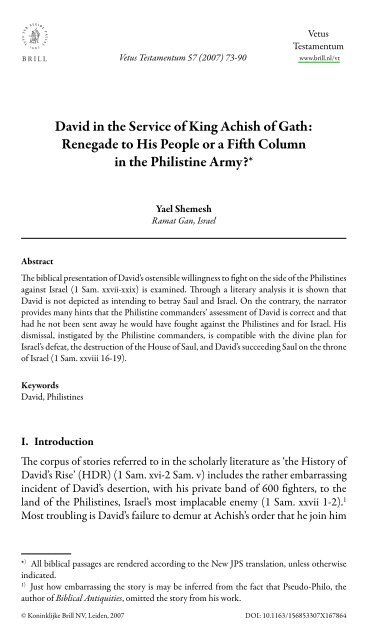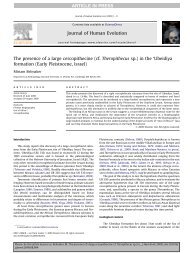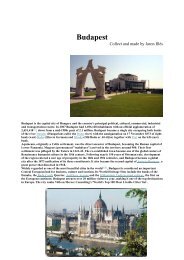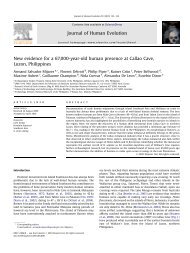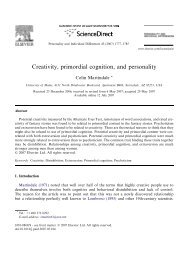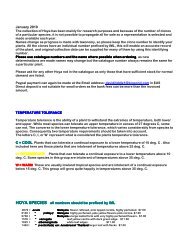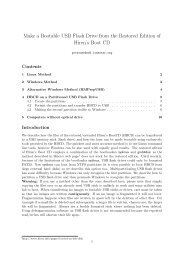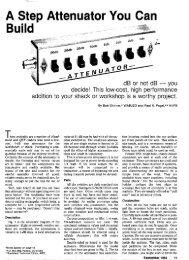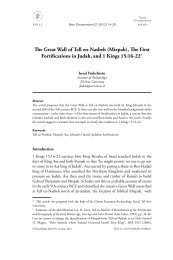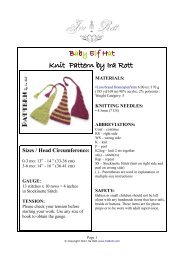David in the Service of King Achish of Gath: Renegade to His ...
David in the Service of King Achish of Gath: Renegade to His ...
David in the Service of King Achish of Gath: Renegade to His ...
You also want an ePaper? Increase the reach of your titles
YUMPU automatically turns print PDFs into web optimized ePapers that Google loves.
<strong>David</strong> <strong>in</strong> <strong>the</strong> <strong>Service</strong> <strong>of</strong> K<strong>in</strong>g <strong>Achish</strong> <strong>of</strong> <strong>Gath</strong>:<br />
<strong>Renegade</strong> <strong>to</strong> <strong>His</strong> People or a Fift h Column<br />
<strong>in</strong> <strong>the</strong> Philist<strong>in</strong>e Army?*<br />
Yael Shemesh<br />
Ramat Gan, Israel<br />
Abstract<br />
Th e biblical presentation <strong>of</strong> <strong>David</strong>’s ostensible will<strong>in</strong>gness <strong>to</strong> fi ght on <strong>the</strong> side <strong>of</strong> <strong>the</strong> Philist<strong>in</strong>es<br />
aga<strong>in</strong>st Israel (1 Sam. xxvii-xxix) is exam<strong>in</strong>ed. Th rough a literary analysis it is shown that<br />
<strong>David</strong> is not depicted as <strong>in</strong>tend<strong>in</strong>g <strong>to</strong> betray Saul and Israel. On <strong>the</strong> contrary, <strong>the</strong> narra<strong>to</strong>r<br />
provides many h<strong>in</strong>ts that <strong>the</strong> Philist<strong>in</strong>e commanders’ assessment <strong>of</strong> <strong>David</strong> is correct and that<br />
had he not been sent away he would have fought aga<strong>in</strong>st <strong>the</strong> Philist<strong>in</strong>es and for Israel. <strong>His</strong><br />
dismissal, <strong>in</strong>stigated by <strong>the</strong> Philist<strong>in</strong>e commanders, is compatible with <strong>the</strong> div<strong>in</strong>e plan for<br />
Israel’s defeat, <strong>the</strong> destruction <strong>of</strong> <strong>the</strong> House <strong>of</strong> Saul, and <strong>David</strong>’s succeed<strong>in</strong>g Saul on <strong>the</strong> throne<br />
<strong>of</strong> Israel (1 Sam. xxviii 16-19).<br />
Keywords<br />
<strong>David</strong>, Philist<strong>in</strong>es<br />
Vetus<br />
Testamentum<br />
Vetus Testamentum 57 (2007) 73-90 www.brill.nl/vt<br />
I. Introduction<br />
Th e corpus <strong>of</strong> s<strong>to</strong>ries referred <strong>to</strong> <strong>in</strong> <strong>the</strong> scholarly literature as ‘<strong>the</strong> <strong>His</strong><strong>to</strong>ry <strong>of</strong><br />
<strong>David</strong>’s Rise’ (HDR) (1 Sam. xvi-2 Sam. v) <strong>in</strong>cludes <strong>the</strong> ra<strong>the</strong>r embarrass <strong>in</strong>g<br />
<strong>in</strong>cident <strong>of</strong> <strong>David</strong>’s desertion, with his private band <strong>of</strong> 600 fighters, <strong>to</strong> <strong>the</strong><br />
land <strong>of</strong> <strong>the</strong> Philist<strong>in</strong>es, Israel’s most implacable enemy (1 Sam. xxvii 1-2). 1<br />
Most troubl<strong>in</strong>g is <strong>David</strong>’s failure <strong>to</strong> demur at <strong>Achish</strong>’s order that he jo<strong>in</strong> him<br />
* ) All biblical passages are rendered accord<strong>in</strong>g <strong>to</strong> <strong>the</strong> New JPS translation, unless o<strong>the</strong>rwise<br />
<strong>in</strong>dicated.<br />
1) Just how embarrass<strong>in</strong>g <strong>the</strong> s<strong>to</strong>ry is may be <strong>in</strong>ferred from <strong>the</strong> fact that Pseudo-Philo, <strong>the</strong><br />
author <strong>of</strong> Biblical Antiquities, omitted <strong>the</strong> s<strong>to</strong>ry from his work.<br />
© Kon<strong>in</strong>klijke Brill NV, Leiden, 2007 DOI: 10.1163/156853307X167864
74 Y. Shemesh / Vetus Testamentum 57 (2007) 73-90<br />
<strong>in</strong> <strong>the</strong> military campaign aga<strong>in</strong>st Israel (1 Sam. xxviii 1-2). In fact, <strong>David</strong> and<br />
his men did march with <strong>the</strong> Philist<strong>in</strong>e army as it advanced <strong>to</strong> <strong>the</strong> decisive<br />
battle at Mount Gilboa (1 Sam. xxix 2). Only <strong>the</strong> <strong>in</strong>tervention <strong>of</strong> <strong>the</strong> Philist<strong>in</strong>e<br />
commanders 2 kept <strong>David</strong> and his men out <strong>of</strong> <strong>the</strong> battle and sent <strong>the</strong>m <strong>to</strong><br />
<strong>the</strong> safe distance <strong>of</strong> Ziklag. Th e biblical narra<strong>to</strong>r says noth<strong>in</strong>g about <strong>the</strong> true<br />
<strong>in</strong>tentions <strong>of</strong> <strong>David</strong> and his men with regard <strong>to</strong> <strong>the</strong> impend<strong>in</strong>g battle. Th is<br />
leaves ample room for speculation: Is it really possible that <strong>David</strong> would have<br />
fought aga<strong>in</strong>st his people and his k<strong>in</strong>g, even if only because he had no choice<br />
<strong>in</strong> <strong>the</strong> matter as a result <strong>of</strong> <strong>the</strong> b<strong>in</strong>d <strong>in</strong> which he found himself at <strong>the</strong> time—<br />
persecuted by Saul and beholden <strong>to</strong> his patron, <strong>Achish</strong>, who had granted him<br />
asylum?<br />
In <strong>the</strong> present paper I hope <strong>to</strong> demonstrate, rely<strong>in</strong>g chiefly on a literary<br />
analysis, that for <strong>the</strong> biblical narra<strong>to</strong>r <strong>the</strong> possibility that <strong>David</strong> might fight<br />
aga<strong>in</strong>st his own people is absurd. Even though <strong>the</strong> narra<strong>to</strong>r does not say this<br />
<strong>in</strong> so many words, he provides ample h<strong>in</strong>ts that had <strong>David</strong> not been sent away<br />
he would have acted as a fift h column and raised his sword aga<strong>in</strong>st his patron,<br />
<strong>Achish</strong>, and not aga<strong>in</strong>st Saul and Israel.<br />
I must emphasize that <strong>the</strong> discussion deals exclusively with <strong>David</strong> as a literary<br />
character, as he is depicted <strong>in</strong> <strong>the</strong> s<strong>to</strong>ries about him, and not with <strong>the</strong><br />
his<strong>to</strong>rical figure, about whom we have no reliable <strong>in</strong>formation. Accord<strong>in</strong>gly<br />
I will not attempt <strong>to</strong> deal with <strong>the</strong> arguments <strong>of</strong> scholars who sought <strong>to</strong><br />
unveil <strong>the</strong> his<strong>to</strong>rical (as opposed <strong>to</strong> <strong>the</strong> literary) <strong>David</strong> and convicted him<br />
not only <strong>of</strong> plann<strong>in</strong>g <strong>to</strong> jo<strong>in</strong> <strong>the</strong> Philist<strong>in</strong>e army (or actually jo<strong>in</strong><strong>in</strong>g it, despite<br />
2) Th ese “commanders” or “<strong>of</strong>ficers” (Heb. μyrç) are not <strong>the</strong> “lords” (μynrs) mentioned <strong>in</strong><br />
verse 2, despite <strong>the</strong> problems with <strong>the</strong> s<strong>to</strong>ry. Accord<strong>in</strong>g <strong>to</strong> <strong>the</strong> narra<strong>to</strong>r, <strong>the</strong> Philist<strong>in</strong>e commanders<br />
are angry with <strong>Achish</strong> for br<strong>in</strong>g<strong>in</strong>g <strong>David</strong> along and demand that he be dismissed<br />
(vv. 3-5). By contrast, <strong>Achish</strong> <strong>in</strong>itially tells <strong>David</strong> that <strong>the</strong> lords disapprove <strong>of</strong> his presence<br />
(v. 6) and urges him <strong>to</strong> leave so as not <strong>to</strong> displease <strong>the</strong> lords (v. 7). Later, however, <strong>Achish</strong><br />
attributes <strong>the</strong> request that <strong>David</strong> be excluded from <strong>the</strong> army <strong>to</strong> <strong>the</strong> Philist<strong>in</strong>e commanders<br />
(v. 9), and this is consistent with what <strong>the</strong> narra<strong>to</strong>r reports. In several manuscripts <strong>of</strong> <strong>the</strong> Septuag<strong>in</strong>t,<br />
<strong>the</strong> negative οὐκ is miss<strong>in</strong>g from <strong>the</strong> last clause <strong>of</strong> verse 6, <strong>in</strong>dicat<strong>in</strong>g that <strong>Achish</strong> and<br />
<strong>the</strong> lords approve <strong>of</strong> <strong>David</strong>, but not <strong>the</strong> commanders. Several scholars subscribe <strong>to</strong> this solution<br />
(but it cannot expla<strong>in</strong> <strong>the</strong> reference <strong>to</strong> <strong>the</strong> lords <strong>in</strong> verse 7). Alter proposes a literary solution:<br />
<strong>in</strong> order <strong>to</strong> re<strong>in</strong>force his words, <strong>Achish</strong> attributes <strong>the</strong> decision <strong>to</strong> send <strong>David</strong> away <strong>to</strong> <strong>the</strong><br />
very highest echelon, substitut<strong>in</strong>g <strong>the</strong> lords for <strong>the</strong> commanders. See R. Alter, Th e <strong>David</strong> S<strong>to</strong>ry<br />
(New York and London, 1999), p. 181. See also H. J. S<strong>to</strong>ebe, Das Erste Buch Samuelis (KOM<br />
8/1; Gütersloh, 1973), pp. 501, 503. Bar Efrat, for his part, suggests that <strong>the</strong> lords accepted<br />
<strong>the</strong> commanders’ position. See S. Bar Efrat, 1 Samuel (A Bible Commentary for Israel; Tel<br />
Aviv and Jerusalem, 1996), p. 355 (Hebrew).
Y. Shemesh / Vetus Testamentum 57 (2007) 73-90 75<br />
<strong>the</strong> denial by <strong>the</strong> biblical narra<strong>to</strong>r), but also <strong>of</strong> direct <strong>in</strong>volvement <strong>in</strong> Saul’s<br />
death. 3 I want <strong>to</strong> show that <strong>the</strong> s<strong>to</strong>ries about <strong>David</strong> <strong>in</strong>dicate that he was no<br />
renegade. Before I present my evidence, however, I would like <strong>to</strong> survey<br />
briefly <strong>the</strong> op<strong>in</strong>ions <strong>of</strong> traditional Jewish commenta<strong>to</strong>rs and modern scholars<br />
about <strong>David</strong>’s conduct as related <strong>in</strong> 1 Sam. xxvii-xxix.<br />
II. <strong>David</strong>’s Loyalty <strong>in</strong> <strong>the</strong> Eyes <strong>of</strong> Traditional Jewish Commenta<strong>to</strong>rs<br />
and Modern Scholars<br />
Most <strong>of</strong> <strong>the</strong> classical Jewish commenta<strong>to</strong>rs (Rashi, <strong>David</strong> Kimhi, Joseph Ibn<br />
Kaspi, and o<strong>the</strong>rs) stick <strong>to</strong> a literal <strong>in</strong>terpretation and never ask about <strong>David</strong>’s<br />
<strong>in</strong>tentions when he jo<strong>in</strong>ed <strong>the</strong> Philist<strong>in</strong>e army. Th e fourteenth-century Jewish<br />
philosopher and commenta<strong>to</strong>r Gersonides (Provence, 1288-1344), by<br />
contrast, <strong>in</strong> his commentary on 1 Sam. xxix 2, does raise <strong>the</strong> question, “How<br />
could <strong>David</strong> agree <strong>to</strong> go with <strong>Achish</strong> <strong>to</strong> fight aga<strong>in</strong>st Israel?” To this question<br />
he answers uncompromis<strong>in</strong>gly:<br />
<strong>David</strong> was compelled <strong>to</strong> do what <strong>Achish</strong> ordered because he was subord<strong>in</strong>ate <strong>to</strong><br />
him, and because he had <strong>to</strong>ld him that he was cont<strong>in</strong>ually raid<strong>in</strong>g Israel, <strong>to</strong> show<br />
[<strong>Achish</strong>] that he was <strong>in</strong> bad odor with his people. In his heart, though, <strong>David</strong>’s<br />
plan was <strong>to</strong> be an adversary <strong>to</strong> <strong>the</strong> Philist<strong>in</strong>es and <strong>to</strong> frustrate <strong>the</strong>ir designs<br />
aga<strong>in</strong>st Israel, and this would be easier if <strong>the</strong>y trusted him. 4<br />
Th e Jewish exegete, philosopher, and statesman Don Isaac Abravanel (1437-<br />
1508) agrees with Gersonides that <strong>David</strong> was loyal <strong>to</strong> Saul, but disagrees<br />
about his treachery <strong>to</strong>ward <strong>Achish</strong>. In his commentary on 1 Sam. xxix 5 he<br />
mentions and rejects Gersonides’ view that <strong>David</strong> <strong>in</strong>tended <strong>to</strong> turn aga<strong>in</strong>st<br />
<strong>the</strong> Philist<strong>in</strong>es: “But this is not my view! Far be it from so honorable a<br />
man as <strong>David</strong> <strong>to</strong> repay <strong>Achish</strong> (even though he was one <strong>of</strong> <strong>the</strong> k<strong>in</strong>gs <strong>of</strong> <strong>the</strong><br />
3) K. W. Whitelam, The Just K<strong>in</strong>g: Monarchical Judicial Authority <strong>in</strong> Ancient Israel (Sheffield,<br />
1979), pp. 104-105, 108, 119; M. Malul, “Was <strong>David</strong> Involved <strong>in</strong> <strong>the</strong> Death <strong>of</strong> Saul on <strong>the</strong><br />
Gilboa Mounta<strong>in</strong>?”, RB 103 (1996), pp. 517-545; S. L. McKenzie, K<strong>in</strong>g <strong>David</strong>: A Biography<br />
(Oxford, 2000), pp. 108-110. Malul and McKenzie do not ma<strong>in</strong>ta<strong>in</strong> that <strong>the</strong> narra<strong>to</strong>r <strong>in</strong>tended<br />
<strong>to</strong> present <strong>David</strong> as Saul’s murderer. On <strong>the</strong> contrary, <strong>the</strong>y agree with <strong>the</strong> common op<strong>in</strong>ion<br />
that <strong>the</strong> s<strong>to</strong>ries <strong>in</strong> HDR constitute an apologia for <strong>David</strong> and are meant <strong>to</strong> acquit him <strong>of</strong> any<br />
blame associated with <strong>the</strong> fall <strong>of</strong> <strong>the</strong> house <strong>of</strong> Saul. Th ey assert, however, that precisely <strong>the</strong>se<br />
attempts <strong>to</strong> clear him demonstrate <strong>the</strong> guilt <strong>of</strong> <strong>the</strong> his<strong>to</strong>rical <strong>David</strong>.<br />
4) Gersonides’ commentary <strong>in</strong> Miqra’ot Gedelot Haketer: Samuel, ed. M. Cohen (Ramat Gan,<br />
[1993]), p. 145 (Hebrew).
76 Y. Shemesh / Vetus Testamentum 57 (2007) 73-90<br />
Philist<strong>in</strong>es) evil for good. Th at would have been a conspiracy and most<br />
unseemly”. In practice Abravanel is try<strong>in</strong>g <strong>to</strong> have it both ways, and <strong>to</strong> depict<br />
<strong>David</strong> as loyal <strong>to</strong> both Saul and <strong>Achish</strong>. Th e only way he can manage this is<br />
by <strong>of</strong>fer<strong>in</strong>g an extremely forced <strong>in</strong>terpretation:<br />
When he went [<strong>to</strong> jo<strong>in</strong> him] <strong>David</strong> thought that he would serve as <strong>Achish</strong>’s<br />
bodyguard and stay near him, but would not fight aga<strong>in</strong>st Israel and not raise his<br />
hand aga<strong>in</strong>st K<strong>in</strong>g Saul; [<strong>in</strong> this way] he would nei<strong>the</strong>r be a help nor a h<strong>in</strong>drance<br />
<strong>to</strong> <strong>the</strong> Philist<strong>in</strong>es. 5<br />
Abravanel does not expla<strong>in</strong> how <strong>David</strong> could have served as <strong>Achish</strong>’s bodyguard<br />
without tak<strong>in</strong>g an active part <strong>in</strong> <strong>the</strong> battle and what role <strong>David</strong> <strong>in</strong>tended<br />
his brigade <strong>of</strong> Hebrews <strong>to</strong> play <strong>in</strong> <strong>the</strong> battle. Similarly, <strong>in</strong> his commentary on<br />
1 Sam. xxvii 8, 10, Abravanel argues that <strong>David</strong>’s raids on <strong>the</strong> Geshurites,<br />
Gizrites, and Amalekites were no betrayal <strong>of</strong> <strong>the</strong> Philist<strong>in</strong>es and <strong>Achish</strong>, but<br />
<strong>in</strong> <strong>the</strong>ir <strong>in</strong>terest, because those tribes pillaged <strong>the</strong> Philist<strong>in</strong>es, <strong>to</strong>o (as stated<br />
explicitly, with regard <strong>to</strong> <strong>the</strong> Amalekites, <strong>in</strong> xxx 16). 6 My feel<strong>in</strong>g is that Abravanel<br />
was <strong>in</strong>fluenced by his own biography: aft er serv<strong>in</strong>g as treasurer <strong>to</strong> K<strong>in</strong>g<br />
Alfonso V <strong>of</strong> Portugal, he was suspected <strong>of</strong> participat<strong>in</strong>g <strong>in</strong> a conspiracy<br />
aga<strong>in</strong>st his successor, João II, and forced <strong>to</strong> flee <strong>to</strong> Spa<strong>in</strong> <strong>in</strong> 1483. It was at this<br />
juncture <strong>in</strong> his life that he wrote his commentary on <strong>the</strong> books <strong>of</strong> Joshua,<br />
Judges, and Samuel. With this immediate background, it is easy <strong>to</strong> understand<br />
that he would deem it important <strong>to</strong> emphasize <strong>the</strong> loyalty <strong>of</strong> Hebrews/<br />
Jews <strong>to</strong> <strong>the</strong> foreign rulers <strong>the</strong>y served. 7<br />
Few modern scholars share <strong>the</strong> confidence <strong>of</strong> Gersonides (and <strong>the</strong> Philist<strong>in</strong>e<br />
commanders) that <strong>David</strong> <strong>in</strong>tended <strong>to</strong> serve as a fift h column and fight<br />
5) Don Isaac Abravanel, Commentary on <strong>the</strong> Former Prophets (Jerusalem, [1955]), p. 301<br />
(Hebrew).<br />
6) Ibid., p. 292.<br />
7) Th e same approach, though more moderate than <strong>in</strong> Abravanel, is taken by Josephus Flavius,<br />
ano<strong>the</strong>r Jew who had <strong>to</strong> prove his loyalty <strong>to</strong> a foreign power. Josephus does not dispel <strong>the</strong><br />
vagueness concern<strong>in</strong>g <strong>David</strong>’s true <strong>in</strong>tentions, but supplements <strong>the</strong> Masoretic text with <strong>Achish</strong>’s<br />
reply <strong>to</strong> <strong>David</strong> that he will be <strong>of</strong> great help even if he rema<strong>in</strong>s <strong>in</strong> <strong>the</strong> rear echelon: “Th ere<br />
keep guard for me over <strong>the</strong> country, lest any <strong>of</strong> <strong>the</strong> enemy <strong>in</strong>vade it. Th at <strong>to</strong>o is <strong>the</strong> part <strong>of</strong> an<br />
ally” (Antiquities <strong>of</strong> <strong>the</strong> Jews VI, 14,5) (tr. Th ackeray and Marcus). Begg notes that <strong>the</strong> “ally<br />
term<strong>in</strong>ology” <strong>in</strong> Josephus’ account <strong>of</strong> <strong>David</strong>’s relations with <strong>the</strong> Philist<strong>in</strong>es is meant <strong>to</strong> show<br />
his Roman readers that “Jews are <strong>in</strong>deed capable <strong>of</strong> be<strong>in</strong>g reliable ‘allies’ <strong>of</strong> a foreign overlord”.<br />
See C. Begg, “<strong>David</strong>’s Dismissal by <strong>the</strong> Philist<strong>in</strong>es accord<strong>in</strong>g <strong>to</strong> Josephus”, Theologische<br />
Zeitschrift 54 (1998), pp. 111-119 (on 118).
Y. Shemesh / Vetus Testamentum 57 (2007) 73-90 77<br />
alongside Israel aga<strong>in</strong>st <strong>the</strong> Philist<strong>in</strong>es. 8 Even those who do so fail <strong>to</strong> present<br />
all <strong>the</strong> evidence that supports this position. A majority <strong>of</strong> scholars, <strong>in</strong>clud<strong>in</strong>g<br />
those who note <strong>the</strong> ambiguity <strong>of</strong> <strong>David</strong>’s statements <strong>to</strong> <strong>Achish</strong> (1 Sam. xxviii<br />
2 and xxix 8), 9 argue that <strong>Achish</strong>’s request placed <strong>David</strong> <strong>in</strong> a dilemma from<br />
which only <strong>the</strong> <strong>in</strong>tervention <strong>of</strong> <strong>the</strong> Philist<strong>in</strong>e commanders allowed him <strong>to</strong><br />
escape, <strong>to</strong> his joy and relief. 10 Accord<strong>in</strong>g <strong>to</strong> <strong>the</strong>m, we cannot know how <strong>David</strong><br />
would have acted if he had not been dismissed from <strong>the</strong> ranks <strong>of</strong> <strong>the</strong> Philist<strong>in</strong>e<br />
army. As Alter writes: “Whe<strong>the</strong>r <strong>David</strong>, lack<strong>in</strong>g his providential way<br />
out, would really have pitted himself aga<strong>in</strong>st his own people is ano<strong>the</strong>r<br />
imponderable <strong>in</strong> <strong>the</strong> character <strong>of</strong> this elusive figure”. 11 A few scholars even<br />
<strong>in</strong>fer from <strong>the</strong> s<strong>to</strong>ry that <strong>David</strong> was s<strong>in</strong>cere <strong>in</strong> his will<strong>in</strong>gness <strong>to</strong> participate <strong>in</strong><br />
<strong>the</strong> battle aga<strong>in</strong>st Saul. Whitlam, for example, asserts that <strong>the</strong> biblical tradition<br />
found <strong>in</strong> 1 Sam. xxvii and xxix <strong>in</strong>dicates that “<strong>David</strong>, as <strong>the</strong> vassal <strong>of</strong><br />
<strong>Achish</strong>, was more than will<strong>in</strong>g <strong>to</strong> take part <strong>in</strong> <strong>the</strong> campaign aga<strong>in</strong>st Saul”. 12<br />
Jobl<strong>in</strong>g holds a similar view and even asserts that <strong>the</strong> <strong>David</strong> depicted <strong>in</strong><br />
1 Sam. xxi and xxvii-xxx has given up his hopes <strong>of</strong> reign<strong>in</strong>g over Israel. He<br />
adds that <strong>the</strong>se chapters expose an anti-monarchical sub<strong>the</strong>me that is <strong>the</strong>ologically<br />
subversive, because it runs counter <strong>to</strong> <strong>the</strong> dom<strong>in</strong>ant current <strong>of</strong> <strong>the</strong><br />
Deuteronomic literature. 13 In support <strong>of</strong> his argument he cites <strong>David</strong>’s <strong>in</strong>ternal<br />
monologue <strong>in</strong> 1 Sam. xxvii 1:<br />
8) Smith notes that <strong>the</strong> narra<strong>to</strong>r certa<strong>in</strong>ly does not assume that <strong>David</strong> would have fought<br />
aga<strong>in</strong>st Saul, though he does not state explicitly that at <strong>the</strong> moment <strong>of</strong> truth <strong>David</strong> was<br />
plann<strong>in</strong>g <strong>to</strong> turn aga<strong>in</strong>st <strong>Achish</strong>. See H. P. Smith, A Critical and Exegetical Commentary on <strong>the</strong><br />
Books <strong>of</strong> Samuel (ICC 8; Ed<strong>in</strong>burgh, 1899), pp. 237, 245. McCarter goes one step fur<strong>the</strong>r and<br />
ma<strong>in</strong>ta<strong>in</strong>s (I th<strong>in</strong>k rightly) that, accord<strong>in</strong>g <strong>to</strong> <strong>the</strong> s<strong>to</strong>ry, “it is subtly but clearly implied that if<br />
he had been [at <strong>the</strong> battle on Gilboa], he would have fought with Saul ra<strong>the</strong>r than aga<strong>in</strong>st<br />
him”. See P. K. McCarter, “Th e Apology <strong>of</strong> <strong>David</strong>”, JBL 99 (1980), pp. 500-501. See also his<br />
book, I Samuel (AB 8; New York, 1980), pp. 427, 428.<br />
9) On <strong>the</strong> ambiguity <strong>of</strong> <strong>David</strong>’s statement, see below, §III 4.<br />
10) See, for example, R. W. Kle<strong>in</strong>, 1 Samuel (WBC 10; Waco, Texas, 1983), p. 276;<br />
W. Brueggemann, “Narrative Intentionality <strong>in</strong> 1 Samuel 29”, JSOT 43 (1989), pp. 25-26, 30;<br />
Alter, The <strong>David</strong> S<strong>to</strong>ry, p. 181; A. F. Campbell, 1 Samuel (FOTL 17; Grand Rapids, Michigan,<br />
2003), p. 277.<br />
11) Alter, The <strong>David</strong> S<strong>to</strong>ry, p. 181.<br />
12) Whitelam, The Just K<strong>in</strong>g, p. 105.<br />
13) D. Jobl<strong>in</strong>g, 1 Samuel (Berit Olam; Collegeville, M<strong>in</strong>nesota, 1998), pp. 232-241; idem,<br />
“<strong>David</strong> and <strong>the</strong> Philist<strong>in</strong>es: With Methodological Reflections”, <strong>in</strong> <strong>David</strong> und Saul im Widerstreit:<br />
Diachronie und Synchronie im Wettstreit, ed. W. Dietrich (OBO 206; Fribourg, 2004),<br />
pp. 74-85.
78 Y. Shemesh / Vetus Testamentum 57 (2007) 73-90<br />
<strong>David</strong> said <strong>to</strong> himself, “Some day I shall certa<strong>in</strong>ly perish at <strong>the</strong> hands <strong>of</strong> Saul.<br />
Th e best th<strong>in</strong>g for me is <strong>to</strong> flee <strong>to</strong> <strong>the</strong> land <strong>of</strong> <strong>the</strong> Philist<strong>in</strong>es; Saul will <strong>the</strong>n give<br />
up hunt<strong>in</strong>g me throughout <strong>the</strong> terri<strong>to</strong>ry <strong>of</strong> Israel, and I will escape him”. 14<br />
Jobl<strong>in</strong>g attributes great importance <strong>to</strong> <strong>the</strong> fact that <strong>David</strong> says this only <strong>to</strong><br />
himself (lit. <strong>to</strong> his heart). He takes this as a sign <strong>of</strong> its trustworth<strong>in</strong>ess, because<br />
<strong>David</strong> would not be ly<strong>in</strong>g <strong>to</strong> himself. I agree with Jobl<strong>in</strong>g that <strong>the</strong> <strong>in</strong>ternal<br />
monologue provides reliable <strong>in</strong>formation about <strong>David</strong>’s thoughts, but it conta<strong>in</strong>s<br />
no more than it states: <strong>David</strong> decided <strong>to</strong> flee <strong>to</strong> Philistia <strong>in</strong> order <strong>to</strong><br />
escape from Saul. We cannot <strong>in</strong>fer from it that ei<strong>the</strong>r <strong>David</strong> or <strong>the</strong> narra<strong>to</strong>r<br />
has given up <strong>the</strong> vision that <strong>David</strong> and his descendants will rule Israel, and<br />
certa<strong>in</strong>ly not that <strong>David</strong> may later be will<strong>in</strong>g <strong>to</strong> fight on <strong>the</strong> side <strong>of</strong> <strong>the</strong> Philist<strong>in</strong>es<br />
aga<strong>in</strong>st his own people. Ano<strong>the</strong>r argument put forward by Rob<strong>in</strong>son<br />
and Jobl<strong>in</strong>g <strong>in</strong> support <strong>of</strong> <strong>the</strong>ir read<strong>in</strong>gs that <strong>David</strong> was s<strong>in</strong>cere about serv<strong>in</strong>g<br />
<strong>Achish</strong> ( Jobl<strong>in</strong>g) or faced a harsh dilemma (Rob<strong>in</strong>son) is that <strong>the</strong> broader<br />
context is at variance with <strong>the</strong> idea that <strong>David</strong> would defect <strong>to</strong> <strong>the</strong> Israelite<br />
side dur<strong>in</strong>g <strong>the</strong> battle. Had Saul and <strong>David</strong> survived <strong>the</strong> battle, asks Jobl<strong>in</strong>g,<br />
“where could <strong>the</strong> s<strong>to</strong>ry go <strong>the</strong>n?”. 15 Rob<strong>in</strong>son even argues that if <strong>David</strong> had<br />
deserted <strong>to</strong> <strong>the</strong> Israelites dur<strong>in</strong>g <strong>the</strong> battle, ensur<strong>in</strong>g <strong>the</strong> defeat <strong>of</strong> <strong>the</strong> Philist<strong>in</strong>es,<br />
Samuel’s doom <strong>of</strong> Saul (1 Sam. xv 26-28; xxviii 16-19) would not have<br />
been realized. 16<br />
We must dist<strong>in</strong>guish, however, between <strong>David</strong>’s <strong>in</strong>tentions and those <strong>of</strong><br />
<strong>the</strong> s<strong>to</strong>ry about him, as well as between <strong>David</strong>’s <strong>in</strong>tentions and <strong>the</strong> consequences<br />
<strong>of</strong> his actions. <strong>David</strong> could have been <strong>to</strong>tally s<strong>in</strong>cere <strong>in</strong> his <strong>in</strong>tention<br />
<strong>to</strong> desert <strong>to</strong> <strong>the</strong> Israelite camp dur<strong>in</strong>g <strong>the</strong> battle, whe<strong>the</strong>r motivated by deepseated<br />
loyalty <strong>to</strong> Israel and Saul or by o<strong>the</strong>r reasons, some <strong>of</strong> <strong>the</strong>m utilitarian.<br />
Samuel’s announcement <strong>to</strong> Saul <strong>of</strong> his and Israel’s doom <strong>in</strong> <strong>the</strong> impend<strong>in</strong>g<br />
battle, <strong>of</strong> which <strong>David</strong> is not aware, cannot be part <strong>of</strong> <strong>David</strong>’s considerations<br />
about his conduct dur<strong>in</strong>g <strong>the</strong> battle. Never<strong>the</strong>less, <strong>the</strong> logic <strong>of</strong> <strong>the</strong> s<strong>to</strong>ry does<br />
mandate that <strong>David</strong> be removed from <strong>the</strong> battlefield. Th is is precisely what<br />
happens, <strong>in</strong> accordance with <strong>the</strong> div<strong>in</strong>e plan and <strong>in</strong> <strong>to</strong>tal isolation from<br />
<strong>David</strong>’s <strong>in</strong>tentions and desires. “Many designs are <strong>in</strong> a man’s m<strong>in</strong>d, but it is<br />
<strong>the</strong> Lord’s plan that is accomplished” (Prov. xix 21).<br />
14) Jobl<strong>in</strong>g, 1 Samuel, pp. 234, 238; idem, “<strong>David</strong> and <strong>the</strong> Philist<strong>in</strong>es”, p. 83.<br />
15) Ibid., p. 82.<br />
16) G. Rob<strong>in</strong>son, Let Us Be Like <strong>the</strong> Nations: A Commentary on <strong>the</strong> Books <strong>of</strong> 1 and 2 Samuel<br />
(Grand Rapids, 1993), p. 145.
Y. Shemesh / Vetus Testamentum 57 (2007) 73-90 79<br />
III. Pro<strong>of</strong>s <strong>of</strong> <strong>David</strong>’s Loyalty <strong>to</strong> Saul and Israel, Accord<strong>in</strong>g <strong>to</strong> <strong>the</strong><br />
Biblical Account<br />
As mentioned, <strong>the</strong> biblical narra<strong>to</strong>r does not <strong>of</strong>fer us a glimpse <strong>of</strong> <strong>David</strong>’s<br />
<strong>in</strong>tentions when he jo<strong>in</strong>ed <strong>Achish</strong>’s forces, on <strong>the</strong> eve <strong>of</strong> <strong>the</strong> battle aga<strong>in</strong>st<br />
Saul and Israel on Mount Gilboa. Instead, he <strong>of</strong>fers two oppos<strong>in</strong>g assessments<br />
<strong>of</strong> <strong>David</strong>’s <strong>in</strong>tentions, that <strong>of</strong> <strong>Achish</strong> and that <strong>of</strong> his subord<strong>in</strong>ates, <strong>the</strong> Philist<strong>in</strong>e<br />
commanders. Here I shall endeavor <strong>to</strong> show that <strong>the</strong> narra<strong>to</strong>r provides<br />
many <strong>in</strong>dications that <strong>the</strong> Philist<strong>in</strong>e commanders’ evaluation is correct,<br />
whereas <strong>Achish</strong>’s is naïve, based on <strong>the</strong> false <strong>in</strong>formation he has been fed<br />
by <strong>David</strong>.<br />
1. Th e utilitarian aspect: Th e implication <strong>of</strong> <strong>the</strong> <strong>David</strong> s<strong>to</strong>ries is that he is<br />
groom<strong>in</strong>g himself <strong>to</strong> be k<strong>in</strong>g <strong>of</strong> Israel aft er Saul’s death (1 Sam. xvi 13; xxiii<br />
17-18; xxiv 20-23; xxv 30). Fight<strong>in</strong>g on <strong>the</strong> Philist<strong>in</strong>e side aga<strong>in</strong>st his people<br />
and his k<strong>in</strong>g would have delivered a mortal blow <strong>to</strong> <strong>David</strong>’s public image and<br />
put paid <strong>to</strong> any chance <strong>of</strong> his be<strong>in</strong>g accepted as a legitimate ruler. So calculat<strong>in</strong>g<br />
a person as <strong>David</strong> would certa<strong>in</strong>ly have been aware <strong>of</strong> <strong>the</strong> political implications<br />
<strong>of</strong> such an act. It is hard <strong>to</strong> believe that he would not have searched<br />
for a stratagem <strong>to</strong> extricate himself from a situation that would strike a mortal<br />
blow at his plans and hopes <strong>of</strong> rul<strong>in</strong>g Israel.<br />
2. <strong>David</strong>’s behavior <strong>in</strong> <strong>the</strong> past: Psychology teaches us that <strong>the</strong> best predic<strong>to</strong>r<br />
<strong>of</strong> a person’s future conduct is his behavior <strong>in</strong> <strong>the</strong> past. If we look at<br />
<strong>David</strong>’s past conduct <strong>to</strong>ward Saul and Israel on <strong>the</strong> one hand, and <strong>to</strong>ward<br />
<strong>Achish</strong> and <strong>the</strong> Philist<strong>in</strong>es on <strong>the</strong> o<strong>the</strong>r, we f<strong>in</strong>d loyalty <strong>to</strong>ward <strong>the</strong> former<br />
and <strong>in</strong>s<strong>in</strong>cerity <strong>in</strong> <strong>David</strong>’s relations with <strong>Achish</strong> and hostility <strong>in</strong> his relations<br />
with <strong>the</strong> Philist<strong>in</strong>es <strong>in</strong> general.<br />
<strong>David</strong>’s actions strongly attest <strong>to</strong> his loyalty <strong>to</strong> Saul. So does <strong>the</strong> evaluation<br />
<strong>of</strong> his character by o<strong>the</strong>r persons, <strong>in</strong>clud<strong>in</strong>g Saul himself. When <strong>David</strong> served<br />
<strong>in</strong> Saul’s army he fought his wars (see 1 Sam. xviii 17, 25). Aft er he fled <strong>the</strong><br />
royal court, <strong>in</strong> danger <strong>of</strong> imm<strong>in</strong>ent death, <strong>David</strong> <strong>to</strong>ok <strong>the</strong> defensive action <strong>of</strong><br />
runn<strong>in</strong>g away, but he never crossed <strong>the</strong> l<strong>in</strong>e and <strong>to</strong>ok <strong>of</strong>fensive action <strong>to</strong> harm<br />
Saul or his followers (see 1 Sam. xxiii 26). When golden opportunities <strong>to</strong> slay<br />
<strong>the</strong> k<strong>in</strong>g who was plott<strong>in</strong>g his death fell <strong>in</strong><strong>to</strong> his lap, he adamantly refused <strong>to</strong><br />
harm Saul <strong>in</strong> self-defense and made certa<strong>in</strong> his men were aware <strong>of</strong> <strong>the</strong> impiety<br />
<strong>of</strong> rais<strong>in</strong>g a hand aga<strong>in</strong>st <strong>the</strong> Lord’s ano<strong>in</strong>ted (1 Sam. xxiv and xxvi). 17<br />
17) In this article I am adopt<strong>in</strong>g a synchronic approach, and accord<strong>in</strong>gly relate <strong>to</strong> 1 Samuel<br />
xxiv and xxvi as represent<strong>in</strong>g two different <strong>in</strong>cidents. Cf. J. Kle<strong>in</strong>, “<strong>David</strong>s Flucht zu den Philistern<br />
(1 Sam. xxi 11ff.; xxvii-xxix)” VT 55 (2005), pp. 179-180.
80 Y. Shemesh / Vetus Testamentum 57 (2007) 73-90<br />
Th is stance is not merely <strong>the</strong>ological, <strong>of</strong> course; it is also based on far-sighted<br />
political vision and an <strong>in</strong>tention <strong>to</strong> establish a taboo that would protect his<br />
own life when he <strong>in</strong> turn became k<strong>in</strong>g and <strong>the</strong> Lord’s ano<strong>in</strong>ted. 18 For our<br />
purposes, however, it matters little whe<strong>the</strong>r <strong>David</strong>’s motives for not harm<strong>in</strong>g<br />
Saul were <strong>the</strong>ological or political. What is important is that it was crucial for<br />
him <strong>to</strong> act accord<strong>in</strong>g <strong>to</strong> <strong>the</strong> pr<strong>in</strong>ciple that one must not harm <strong>the</strong> Lord’s<br />
ano<strong>in</strong>ted and <strong>to</strong> <strong>in</strong>doctr<strong>in</strong>ate his men accord<strong>in</strong>gly (1 Sam. xxiv 7; xxvi 9-11).<br />
Th e narra<strong>to</strong>r reports that <strong>David</strong> reproached himself even for <strong>the</strong> mild lèsemajesté<br />
<strong>of</strong> cutt<strong>in</strong>g <strong>of</strong>f <strong>the</strong> corner <strong>of</strong> Saul’s cloak (1 Sam. xxiv 6). Is it conceivable,<br />
aft er all this, that he would agree <strong>to</strong> fight aga<strong>in</strong>st Saul and raise his hand<br />
aga<strong>in</strong>st <strong>the</strong> Lord’s ano<strong>in</strong>ted?<br />
<strong>David</strong>’s loyalty <strong>to</strong> Saul is attested by Jonathan, who, vent<strong>in</strong>g his deepest<br />
emotions, begs his fa<strong>the</strong>r not <strong>to</strong> harm <strong>David</strong>:<br />
He has not wronged you; <strong>in</strong>deed, all his actions have been very much <strong>to</strong> your<br />
advantage. He <strong>to</strong>ok his life <strong>in</strong> his hands and killed <strong>the</strong> Philist<strong>in</strong>e, and <strong>the</strong> Lord<br />
wrought a great vic<strong>to</strong>ry for all Israel. You saw it and rejoiced. Why <strong>the</strong>n should<br />
you <strong>in</strong>cur <strong>the</strong> guilt <strong>of</strong> shedd<strong>in</strong>g <strong>the</strong> blood <strong>of</strong> an <strong>in</strong>nocent man, kill<strong>in</strong>g <strong>David</strong><br />
without cause? (1 Sam. xix 4-5). 19<br />
Th e priest Ahimelech, <strong>to</strong>o, characterizes <strong>David</strong> as <strong>the</strong> most loyal <strong>of</strong> all <strong>of</strong><br />
Saul’s courtiers who always does his bidd<strong>in</strong>g (1 Sam. xxii 14). Saul himself, <strong>in</strong><br />
a passionate outburst, recognizes <strong>the</strong> <strong>in</strong>justice <strong>of</strong> his persecution <strong>of</strong> <strong>the</strong> <strong>in</strong>nocent<br />
<strong>David</strong> (1 Sam. xxiv 17-20; xxvi 21).<br />
An <strong>in</strong>dication <strong>of</strong> <strong>David</strong>’s allegiance <strong>to</strong> his people is <strong>the</strong> fact that even while<br />
runn<strong>in</strong>g for his life, he s<strong>to</strong>ps <strong>to</strong> assist <strong>the</strong> residents <strong>of</strong> Keilah and rescue <strong>the</strong>m<br />
from <strong>the</strong> Philist<strong>in</strong>es (1 Sam. xxiii 5). Abigail has good cause for describ<strong>in</strong>g<br />
him as a man who fights <strong>the</strong> battles <strong>of</strong> <strong>the</strong> Lord (1 Sam. xxv 28) when she<br />
urges him <strong>to</strong> cont<strong>in</strong>ue <strong>in</strong> this path so that no evil ever be found <strong>in</strong> him (ibid.).<br />
While <strong>David</strong> was resident <strong>in</strong> Ziklag, under <strong>the</strong> patronage <strong>of</strong> K<strong>in</strong>g <strong>Achish</strong> <strong>of</strong><br />
<strong>Gath</strong>, he was careful not <strong>to</strong> attack his own people, <strong>in</strong>stead fight<strong>in</strong>g <strong>the</strong>ir enemies—<strong>the</strong><br />
Geshurites, <strong>the</strong> Gizrites, and especially <strong>the</strong> archetypical enemy <strong>of</strong><br />
Israel, Amalek (1 Sam. xxvii 8-9). As Herzberg notes, “<strong>David</strong> is already beg<strong>in</strong>-<br />
18) See, for example, W. Brueggemann, <strong>David</strong>’s Truth <strong>in</strong> Israel’s Imag<strong>in</strong>ation and Memory<br />
(Philadelphia, 1985), p. 37; K. L. Noll, The Faces <strong>of</strong> <strong>David</strong> (Sheffield, 1997), p. 57.<br />
19) See also Jonathan’s defense <strong>of</strong> <strong>David</strong> <strong>in</strong> 1 Sam. xx 32, where he asks his fa<strong>the</strong>r, “Why should<br />
he be put <strong>to</strong> death? What has he done?”
Y. Shemesh / Vetus Testamentum 57 (2007) 73-90 81<br />
n<strong>in</strong>g <strong>the</strong> task which he was later <strong>to</strong> complete: that <strong>of</strong> conquer<strong>in</strong>g <strong>the</strong> whole<br />
<strong>of</strong> <strong>the</strong> neighbor<strong>in</strong>g peoples”. 20<br />
It is even possible that for <strong>the</strong> narra<strong>to</strong>r, <strong>David</strong>’s cruel deeds—annihilat<strong>in</strong>g<br />
<strong>the</strong> <strong>in</strong>habitants <strong>of</strong> <strong>the</strong> places he raids (1 Sam. xxvii 11)—are <strong>the</strong> fulfillment<br />
<strong>of</strong> <strong>the</strong> Lord’s <strong>in</strong>junction <strong>to</strong> Moses and Joshua <strong>to</strong> destroy all <strong>the</strong> residents <strong>of</strong><br />
<strong>the</strong> land. 21 Th e narra<strong>to</strong>r even deviates from <strong>the</strong> chronology <strong>of</strong> <strong>the</strong> s<strong>to</strong>ry <strong>to</strong><br />
<strong>in</strong>form us <strong>of</strong> <strong>the</strong> long-term pr<strong>of</strong>it <strong>to</strong> <strong>the</strong> K<strong>in</strong>gdom <strong>of</strong> Judah <strong>of</strong> <strong>David</strong>’s temporary<br />
alliance with <strong>the</strong> Philist<strong>in</strong>e enemy: “At that time <strong>Achish</strong> granted him<br />
Ziklag; that is how Ziklag came <strong>to</strong> belong <strong>to</strong> <strong>the</strong> k<strong>in</strong>gs <strong>of</strong> Judah, as is still <strong>the</strong><br />
case” (1 Sam. xxvii 6). 22 What is more, aft er defeat<strong>in</strong>g <strong>the</strong> Amalekites who<br />
had burned Ziklag, <strong>David</strong> sends some <strong>of</strong> <strong>the</strong> spoils <strong>to</strong> <strong>the</strong> elders <strong>of</strong> Judah<br />
(1 Sam. xxx 26-31). It is true that his motives are undoubtedly political ra<strong>the</strong>r<br />
than altruistic, but <strong>the</strong> gesture does <strong>in</strong>dicate <strong>the</strong> importance he attached <strong>to</strong><br />
ma<strong>in</strong>ta<strong>in</strong><strong>in</strong>g good relations with his people. It makes it clear that <strong>David</strong> did<br />
not see himself serv<strong>in</strong>g <strong>Achish</strong> for <strong>the</strong> rest <strong>of</strong> his life (1 Sam. xxvii 12), but<br />
fully <strong>in</strong>tended <strong>to</strong> w<strong>in</strong> <strong>the</strong> crown <strong>of</strong> Judah (<strong>in</strong>itially) and Israel.<br />
In contrast <strong>to</strong> <strong>David</strong>’s loyalty <strong>to</strong> his own people, he was a bitter enemy <strong>of</strong><br />
<strong>the</strong> Philist<strong>in</strong>es. <strong>His</strong> first belligerent action, when he was still a youth, before<br />
he served <strong>in</strong> Saul’s army, was aga<strong>in</strong>st Goliath, <strong>the</strong> Philist<strong>in</strong>e giant from Gat,<br />
which concluded with his cutt<strong>in</strong>g <strong>of</strong>f Goliath’s head. <strong>His</strong> vic<strong>to</strong>ry over Goliath<br />
determ<strong>in</strong>ed <strong>the</strong> outcome <strong>of</strong> <strong>the</strong> entire campaign and sparked <strong>the</strong> Israelite vic<strong>to</strong>ry<br />
over <strong>the</strong> Philist<strong>in</strong>es (1 Sam. xvii). When he served Saul, <strong>David</strong> brought<br />
him 200 Philist<strong>in</strong>e foresk<strong>in</strong>s (even though <strong>the</strong> demand was only for 100) as<br />
<strong>the</strong> dowry for Michal (1 Sam. xviii 27). He cont<strong>in</strong>ued <strong>to</strong> fight aga<strong>in</strong>st <strong>the</strong><br />
Philist<strong>in</strong>es when he served <strong>in</strong> Saul’s army (1 Sam. xviii 30; xix 8) and even<br />
aft erwards, as a persecuted refugee, when he delivered <strong>the</strong> <strong>in</strong>habitants <strong>of</strong><br />
Keilah (1 Sam. xxiii 1-5). To complete <strong>the</strong> picture we should note that if we<br />
turn our glance <strong>to</strong> <strong>the</strong> future relations between <strong>David</strong> and <strong>the</strong> Philist<strong>in</strong>es, he<br />
20) H. W. Hertzberg, 1 & II Samuel (OTL 8; London, 1964) p. 215. See also Brueg gemann,<br />
“Narrative Intentionality <strong>in</strong> 1 Samuel 29”, p. 29.<br />
21) Rob<strong>in</strong>son, Let Us Be Like <strong>the</strong> Nations, p. 140; R. D. Bergen, 1, 2 Samuel (Th e New American<br />
Commentary 7; Nashville, 1996), pp. 261-262. But I do not agree with Bergen that <strong>David</strong><br />
“was careful <strong>to</strong> follow <strong>the</strong> prescribed rules <strong>of</strong> warfare” (ibid., p. 262). Th e narra<strong>to</strong>r makes it<br />
pla<strong>in</strong> that <strong>David</strong>’s motive was tactical, not <strong>the</strong>ological: destroy<strong>in</strong>g <strong>the</strong> ‘evidence’ so that <strong>Achish</strong><br />
could not f<strong>in</strong>d out whom <strong>David</strong> was really attack<strong>in</strong>g while he was resident <strong>in</strong> Ziklag (1<br />
Sam. xxvii 11).<br />
22) J. P. Fokkelman, Narrative Art and Poetry <strong>in</strong> <strong>the</strong> Books <strong>of</strong> Samuel, vol. II: The Cross<strong>in</strong>g Fates<br />
(Assen, 1986), p. 562; Bergen, 1, 2 Samuel, p. 261.
82 Y. Shemesh / Vetus Testamentum 57 (2007) 73-90<br />
cont<strong>in</strong>ues <strong>to</strong> be <strong>the</strong>ir mortal foe even aft er he becomes k<strong>in</strong>g <strong>of</strong> Judah and<br />
Israel. When Abner urges <strong>the</strong> elders <strong>of</strong> Israel <strong>to</strong> transfer <strong>the</strong>ir allegiance <strong>to</strong><br />
<strong>David</strong>, he argues that “<strong>the</strong> Lord has said concern<strong>in</strong>g <strong>David</strong>: ‘I will deliver My<br />
people Israel from <strong>the</strong> hands <strong>of</strong> <strong>the</strong> Philist<strong>in</strong>es and all its o<strong>the</strong>r enemies<br />
through My servant <strong>David</strong>’” (2 Sam. iii 18). And aft er <strong>David</strong> is ano<strong>in</strong>ted k<strong>in</strong>g<br />
<strong>of</strong> all Israel he cont<strong>in</strong>ues his wars aga<strong>in</strong>st <strong>the</strong> Philist<strong>in</strong>es (2 Sam. v 17-25; viii 1).<br />
As for <strong>David</strong>’s relations with <strong>Achish</strong>, we know that <strong>David</strong> was disloyal and<br />
<strong>in</strong>s<strong>in</strong>cere from <strong>the</strong> very beg<strong>in</strong>n<strong>in</strong>g, s<strong>in</strong>ce he brazenly lied <strong>to</strong> him about <strong>the</strong><br />
targets <strong>of</strong> his raids (1 Sam. xxvii 8-12) and made sure <strong>to</strong> leave no survivors<br />
who might <strong>in</strong>form <strong>Achish</strong> <strong>of</strong> his duplicity. Th e narra<strong>to</strong>r even underscores<br />
that this was not a one-time matter, but that “such was his practice as long as<br />
he stayed <strong>in</strong> <strong>the</strong> terri<strong>to</strong>ry <strong>of</strong> <strong>the</strong> Philist<strong>in</strong>es” (1 Sam. xxvii 11).<br />
3. How <strong>David</strong> and his men react when <strong>the</strong>y hear <strong>the</strong> bitter tid<strong>in</strong>gs <strong>of</strong><br />
Israel’s defeat and <strong>the</strong> deaths <strong>of</strong> Saul and Jonathan: When <strong>David</strong> and his men<br />
learn <strong>of</strong> <strong>the</strong> outcome <strong>of</strong> <strong>the</strong> battle at Mount Gilboa <strong>the</strong>y rend <strong>the</strong>ir garments,<br />
lament, weep, and fast until <strong>the</strong> even<strong>in</strong>g, mourn<strong>in</strong>g <strong>the</strong> deaths <strong>of</strong> Saul, Jonathan,<br />
and <strong>the</strong> house <strong>of</strong> Israel (2 Sam. i 11-12). Th is is not <strong>the</strong> reaction <strong>of</strong><br />
persons who only shortly earlier had <strong>in</strong>tended <strong>to</strong> fight aga<strong>in</strong>st Israel on<br />
<strong>the</strong> side <strong>of</strong> <strong>the</strong> Philist<strong>in</strong>es. At <strong>the</strong> start <strong>of</strong> <strong>David</strong>’s dirge for Saul and Jonathan<br />
(vv. 17-27) he refers <strong>to</strong> <strong>the</strong> Philist<strong>in</strong>es as <strong>the</strong> enemy: “Tell it not <strong>in</strong> <strong>Gath</strong>, do<br />
not proclaim it <strong>in</strong> <strong>the</strong> streets <strong>of</strong> Ashkelon, lest <strong>the</strong> daughters <strong>of</strong> <strong>the</strong> Philist<strong>in</strong>e<br />
rejoice, lest <strong>the</strong> daughters <strong>of</strong> <strong>the</strong> uncircumcised exult” (2 Sam. i 20). Even <strong>the</strong><br />
Amalekite lad who br<strong>in</strong>gs <strong>the</strong> news knows where <strong>the</strong> allegiance <strong>of</strong> <strong>David</strong> and<br />
his men lies (at least <strong>of</strong>ficially), because he comes <strong>to</strong> <strong>the</strong>m with his garments<br />
<strong>to</strong>rn and ashes on his head (v. 2). It is true that he evidently believes that<br />
<strong>David</strong>, <strong>in</strong> his heart <strong>of</strong> hearts, will be glad <strong>of</strong> <strong>the</strong> news <strong>of</strong> Saul’s death and<br />
reward him accord<strong>in</strong>gly; but he also knows that <strong>of</strong>ficially <strong>David</strong> is loyal <strong>to</strong><br />
Saul and will put on <strong>the</strong> trapp<strong>in</strong>gs <strong>of</strong> mourn<strong>in</strong>g when he hears his report.<br />
Th is is why <strong>the</strong> Amalekite takes <strong>the</strong> trouble <strong>of</strong> pretend<strong>in</strong>g <strong>to</strong> grieve himself<br />
and emphasizes that he slew Saul at <strong>the</strong> latter’s express request, as an act <strong>of</strong><br />
mercy, s<strong>in</strong>ce <strong>the</strong> stricken k<strong>in</strong>g had no hope <strong>of</strong> surviv<strong>in</strong>g (vv. 9-10). None <strong>of</strong><br />
this helps him, however, and <strong>David</strong> orders his execution, because he dared<br />
raise his hand aga<strong>in</strong>st <strong>the</strong> Lord’s ano<strong>in</strong>ted (vv. 15-16). Th us <strong>David</strong> cont<strong>in</strong>ues<br />
<strong>to</strong> streng<strong>the</strong>n <strong>the</strong> taboo <strong>of</strong> harm<strong>in</strong>g <strong>the</strong> Lord’s ano<strong>in</strong>ted even aft er Saul’s<br />
death. 23 <strong>His</strong> harsh reaction <strong>to</strong> <strong>the</strong> news and his order <strong>to</strong> execute <strong>the</strong> Amalekite,<br />
despite <strong>the</strong> fact that on his own account his <strong>in</strong>tention was <strong>to</strong> be merciful<br />
23) See above, §III 2.
Y. Shemesh / Vetus Testamentum 57 (2007) 73-90 83<br />
<strong>to</strong> Saul, re<strong>in</strong>force <strong>the</strong> argument that <strong>David</strong> would never have allowed himself<br />
<strong>to</strong> be <strong>in</strong>volved <strong>in</strong> an action aimed at <strong>the</strong> ano<strong>in</strong>ted <strong>of</strong> <strong>the</strong> Lord and Israel. It<br />
was always important for <strong>David</strong> <strong>to</strong> establish his <strong>in</strong>nocence <strong>in</strong> everyth<strong>in</strong>g<br />
associated with <strong>the</strong> House <strong>of</strong> Saul, as can be learned from <strong>the</strong> harsh punishment<br />
<strong>of</strong> <strong>the</strong> assass<strong>in</strong>s <strong>of</strong> Ish-Boshet (2 Sam. iv 9-12) and his reaction <strong>to</strong> Joab’s<br />
slay<strong>in</strong>g <strong>of</strong> Abner (2 Sam. iii 28-39 and 1 K<strong>in</strong>gs ii 5-6), and, conversely, by his<br />
bless<strong>in</strong>g <strong>of</strong> <strong>the</strong> people <strong>of</strong> Jabesh-Gilead for bury<strong>in</strong>g Saul and his sons (2 Sam.<br />
ii 5-7).<br />
4. <strong>David</strong>’s use <strong>of</strong> ambiguous language: When <strong>Achish</strong> <strong>in</strong>forms <strong>David</strong> that<br />
he expects him and his men <strong>to</strong> jo<strong>in</strong> <strong>the</strong> Philist<strong>in</strong>e army <strong>in</strong> <strong>the</strong> campaign<br />
aga<strong>in</strong>st Saul (1 Sam. xxviii 1), <strong>David</strong> replies <strong>in</strong> a vague fashion that can be<br />
unders<strong>to</strong>od both ways: “You surely know what your servant will do” (1 Sam.<br />
xxviii 2). <strong>Achish</strong> hears what he wants <strong>to</strong> hear—a promise <strong>of</strong> loyal and devoted<br />
service; but readers are <strong>in</strong>vited <strong>to</strong> understand it as an implicit threat. <strong>David</strong><br />
employs ambiguous language aga<strong>in</strong> when he protests his dismissal by <strong>Achish</strong>:<br />
“But what have I done, what fault have you found <strong>in</strong> your servant from<br />
<strong>the</strong> day I appeared before you <strong>to</strong> this day, that I should not go and fight<br />
aga<strong>in</strong>st <strong>the</strong> enemies <strong>of</strong> my lord <strong>the</strong> k<strong>in</strong>g?” (1 Sam. xxix 8). 24 <strong>Achish</strong>, <strong>of</strong> course,<br />
believes that <strong>David</strong>’s “my lord <strong>the</strong> k<strong>in</strong>g” refers <strong>to</strong> him; <strong>David</strong> certa<strong>in</strong>ly wants<br />
him <strong>to</strong> understand it that way. It seems, however, that <strong>the</strong> true mean<strong>in</strong>g is<br />
that <strong>David</strong> wants <strong>to</strong> fight aga<strong>in</strong>st <strong>the</strong> enemies <strong>of</strong> his k<strong>in</strong>g, Saul; that is, aga<strong>in</strong>st<br />
<strong>the</strong> Philist<strong>in</strong>es. Th is read<strong>in</strong>g is streng<strong>the</strong>ned by <strong>the</strong> fact that <strong>David</strong> nowhere<br />
refers <strong>to</strong> <strong>Achish</strong> as “my lord <strong>the</strong> k<strong>in</strong>g”, but does refer <strong>to</strong> Saul <strong>in</strong> this fashion on<br />
those occasions when he demonstrates his loyalty by refra<strong>in</strong><strong>in</strong>g from kill<strong>in</strong>g<br />
him (1 Sam. xxiv 9; xxvi 17, 19). What is more, <strong>the</strong> assertion that <strong>David</strong>’s “my<br />
lord <strong>the</strong> k<strong>in</strong>g” means Saul is supported by <strong>the</strong> Philist<strong>in</strong>e commanders and<br />
even by <strong>Achish</strong> himself. When <strong>the</strong> former, as<strong>to</strong>nished at <strong>the</strong> Hebrews’ presence<br />
<strong>in</strong> <strong>the</strong> Philist<strong>in</strong>e camp, ask <strong>Achish</strong> for an explanation, he somewhat surpris<strong>in</strong>gly<br />
replies, “that’s <strong>David</strong>, <strong>the</strong> servant <strong>of</strong> Saul, k<strong>in</strong>g <strong>of</strong> Israel” (1 Sam. xxix 3).<br />
Referr<strong>in</strong>g <strong>to</strong> <strong>David</strong> <strong>in</strong> this ve<strong>in</strong> does not seem <strong>to</strong> be a good way <strong>of</strong> achiev<strong>in</strong>g<br />
<strong>Achish</strong>’s objective—allay<strong>in</strong>g <strong>the</strong> Philist<strong>in</strong>e commanders’ qualms about <strong>the</strong><br />
Hebrew auxiliaries’ participation <strong>in</strong> <strong>the</strong> battle. In fact <strong>the</strong> Philist<strong>in</strong>e commanders,<br />
naturally enough, angrily re<strong>to</strong>rt, “for with what could that fellow<br />
appease his master if not with <strong>the</strong> heads <strong>of</strong> <strong>the</strong>se men?” (1 Sam. xxix 4).<br />
Above all, even when <strong>Achish</strong> ultimately orders <strong>David</strong> <strong>to</strong> leave <strong>the</strong> Philist<strong>in</strong>e<br />
24) See, for example, McCarter, I Samuel, p. 427; Kle<strong>in</strong>, 1 Samuel, p. 278; Alter, The <strong>David</strong><br />
S<strong>to</strong>ry, p. 181.
84 Y. Shemesh / Vetus Testamentum 57 (2007) 73-90<br />
camp, he def<strong>in</strong>es Saul as <strong>David</strong>’s lord and <strong>the</strong> Hebrew warriors as <strong>the</strong> servants<br />
<strong>of</strong> Saul: “So rise early <strong>in</strong> <strong>the</strong> morn<strong>in</strong>g, you and your lord’s servants who came<br />
with you—rise early <strong>in</strong> <strong>the</strong> morn<strong>in</strong>g, and leave as soon as it is light”<br />
(1 Sam. xxix 10). We should note that all this is said immediately aft er <strong>David</strong><br />
expresses <strong>to</strong> <strong>Achish</strong> his displeasure that he is not be<strong>in</strong>g given an opportunity<br />
<strong>to</strong> fight “aga<strong>in</strong>st <strong>the</strong> enemies <strong>of</strong> my lord <strong>the</strong> k<strong>in</strong>g” (1 Sam. xxix 8). What is<br />
more, <strong>David</strong>’s desire <strong>to</strong> fight aga<strong>in</strong>st <strong>the</strong> enemies <strong>of</strong> “my Lord <strong>the</strong> k<strong>in</strong>g” echoes<br />
Saul’s language when he agreed <strong>to</strong> make <strong>David</strong> his son-<strong>in</strong>-law <strong>in</strong> exchange for<br />
his mak<strong>in</strong>g war on <strong>the</strong> Philist<strong>in</strong>es: “be my warrior and fight <strong>the</strong> battles <strong>of</strong> <strong>the</strong><br />
Lord” (1 Sam. xviii 17) and take “vengeance on <strong>the</strong> k<strong>in</strong>g’s enemies” (v. 25).<br />
5. Th e reference <strong>to</strong> <strong>the</strong> battle <strong>in</strong> <strong>the</strong> Elah Valley, <strong>in</strong> which <strong>David</strong> played a<br />
decisive role <strong>in</strong> <strong>the</strong> vic<strong>to</strong>ry over <strong>the</strong> Philist<strong>in</strong>es: To rem<strong>in</strong>d <strong>Achish</strong> <strong>of</strong> <strong>David</strong>’s<br />
popularity <strong>in</strong> Israel and <strong>of</strong> <strong>the</strong> danger he poses <strong>to</strong> <strong>the</strong> Philist<strong>in</strong>es, <strong>the</strong> commanders<br />
quote <strong>the</strong> praises <strong>of</strong> <strong>David</strong> sung all over Israel: “Remember, he is <strong>the</strong><br />
<strong>David</strong> <strong>of</strong> whom <strong>the</strong>y sang as <strong>the</strong>y danced: ‘Saul has sla<strong>in</strong> his thousands;<br />
<strong>David</strong>, his tens <strong>of</strong> thousands’” (1 Sam. xxix 5). Of course <strong>the</strong> commanders do<br />
not state so outright, but readers are well aware that those thousands and ten<br />
thousands sla<strong>in</strong> by <strong>David</strong>, <strong>in</strong> <strong>the</strong> song <strong>the</strong>y quote, are none o<strong>the</strong>r than <strong>the</strong><br />
Philist<strong>in</strong>es <strong>the</strong>mselves, and that <strong>the</strong> song <strong>in</strong> question was composed aft er<br />
<strong>David</strong> had fought aga<strong>in</strong>st Goliath and <strong>the</strong> Philist<strong>in</strong>es <strong>in</strong> <strong>the</strong> Elah Valley<br />
(1 Sam. xviii 7). 25<br />
Th e s<strong>to</strong>ry <strong>of</strong> <strong>the</strong> Gilboa campaign resembles that <strong>of</strong> <strong>the</strong> Elah Valley <strong>in</strong> several<br />
ways. In both cases <strong>the</strong> Philist<strong>in</strong>es <strong>in</strong>itiated <strong>the</strong> hostilities; <strong>in</strong> both we<br />
read <strong>of</strong> <strong>the</strong> preparations for <strong>the</strong> battle and <strong>of</strong> <strong>the</strong> disposition <strong>of</strong> <strong>the</strong> oppos<strong>in</strong>g<br />
camps (1 Sam. xvii 1-3, 21; xxviii 4). On both occasions Saul’s fear <strong>of</strong> <strong>the</strong><br />
Philist<strong>in</strong>es is emphasized (1 Sam. xvii 11, 32; xxviii 5). In both wars <strong>David</strong><br />
asks <strong>the</strong> k<strong>in</strong>g (Saul <strong>in</strong> <strong>the</strong> former case, <strong>Achish</strong> <strong>in</strong> <strong>the</strong> latter) for permission <strong>to</strong><br />
take part <strong>in</strong> <strong>the</strong> battle and tries <strong>to</strong> conv<strong>in</strong>ce him <strong>of</strong> his suitability for this<br />
(1 Sam. xvii 32, 34-37; xxix 8). Th e doubts about <strong>David</strong>’s military abilities<br />
cause his request <strong>to</strong> do battle with Goliath <strong>to</strong> be refused <strong>in</strong>itially (1 Sam. xvii 33).<br />
25) Cf. F. S<strong>to</strong>lz, Das Erste und Zweite Buch Samuel (ZBK 9; Zürich, 1981), p. 176. I do not,<br />
however, accept his assertion (ibid.), shared by S<strong>to</strong>ebe (Das Erste Buch Samuelis,<br />
p. 502), that s<strong>in</strong>ce <strong>in</strong> <strong>the</strong> end <strong>David</strong> is released from service and sent away, <strong>the</strong> question <strong>of</strong> what<br />
he would have done if he had been forced <strong>to</strong> participate <strong>in</strong> <strong>the</strong> battle is out <strong>of</strong> place. S<strong>to</strong>lz<br />
ma<strong>in</strong>ta<strong>in</strong>s that this is a “typically modern question,” but I see no reason <strong>to</strong> assume that modern<br />
readers are any different than ancient readers and listeners <strong>in</strong> such matters. It is only natural<br />
that a question associated with <strong>the</strong> extend <strong>of</strong> <strong>David</strong>’s loyalty <strong>to</strong> <strong>the</strong> k<strong>in</strong>g <strong>of</strong> Israel and <strong>the</strong> people<br />
<strong>of</strong> Israel would also engage <strong>the</strong> ancient audience for <strong>the</strong> s<strong>to</strong>ry.
Y. Shemesh / Vetus Testamentum 57 (2007) 73-90 85<br />
Th e suspicions about <strong>David</strong>’s loyalty <strong>to</strong> <strong>the</strong> Philist<strong>in</strong>es cause his request <strong>to</strong><br />
jo<strong>in</strong> <strong>the</strong> war aga<strong>in</strong>st <strong>the</strong> enemies <strong>of</strong> “my lord <strong>the</strong> k<strong>in</strong>g” <strong>to</strong> be rejected once and<br />
for all (1 Sam. xxix 9-10). In <strong>the</strong> Elah Valley <strong>David</strong> saved Israel from<br />
<strong>the</strong> Philist<strong>in</strong>es <strong>in</strong> what seemed <strong>to</strong> be a hopeless situation: he found a way <strong>to</strong><br />
defeat <strong>the</strong> terrify<strong>in</strong>g Goliath, killed him, and cut <strong>of</strong>f his head. Th e Philist<strong>in</strong>es,<br />
see<strong>in</strong>g <strong>the</strong>ir hero dead, fled for <strong>the</strong>ir lives (1 Sam. xvii 49-53). Th e Philist<strong>in</strong>e<br />
commanders’ reference <strong>to</strong> this less-than-glorious chapter <strong>in</strong> Philist<strong>in</strong>e his<strong>to</strong>ry<br />
on <strong>the</strong> eve <strong>of</strong> <strong>the</strong> battle on Mount Gilboa is a h<strong>in</strong>t that if <strong>David</strong> is allowed <strong>to</strong><br />
fight on that field, he would repeat his youthful exploit and save his people<br />
and k<strong>in</strong>g from <strong>the</strong> Philist<strong>in</strong>es. As <strong>Achish</strong>’s bodyguard he will be well positioned<br />
<strong>to</strong> kill him (as <strong>the</strong> commanders argue), <strong>the</strong>reby demoraliz<strong>in</strong>g <strong>the</strong> Philist<strong>in</strong>e<br />
camp and sett<strong>in</strong>g <strong>of</strong>f a panic-stricken rout. 26<br />
6. <strong>Achish</strong>’s characterization as a naïve if not <strong>in</strong>deed foolish monarch:<br />
From <strong>the</strong> very beg<strong>in</strong>n<strong>in</strong>g <strong>of</strong> <strong>the</strong> relationship between <strong>Achish</strong> and <strong>David</strong>, <strong>the</strong><br />
Hebrew leads <strong>the</strong> Philist<strong>in</strong>e by <strong>the</strong> nose. <strong>Achish</strong> is delighted <strong>to</strong> accept unquestioned<br />
<strong>David</strong>’s report about his ostensible raids <strong>in</strong><strong>to</strong> Judahite terri<strong>to</strong>ry. He<br />
benefits from <strong>the</strong> spoils that <strong>David</strong> br<strong>in</strong>gs him and never s<strong>to</strong>ps <strong>to</strong> ask himself<br />
why he has never received from <strong>David</strong> any human booty <strong>in</strong> <strong>the</strong> form <strong>of</strong><br />
Hebrew slaves. <strong>David</strong> is lucky that he is never asked <strong>to</strong> present his patron<br />
with one hundred circumcised Hebrew organs. . . . Th us <strong>Achish</strong> bases his<br />
op<strong>in</strong>ion <strong>of</strong> <strong>David</strong> on <strong>the</strong> false <strong>in</strong>telligence that <strong>David</strong> provides him: “<strong>Achish</strong><br />
trusted <strong>David</strong>. He thought: ‘He has aroused <strong>the</strong> wrath <strong>of</strong> his own people<br />
Israel, and so he will be my vassal forever’” (1 Sam. xxvii 12).<br />
When <strong>Achish</strong> <strong>in</strong>forms <strong>David</strong> that he must march with him <strong>to</strong> <strong>the</strong> battle<br />
aga<strong>in</strong>st Israel, he is not sensitive enough <strong>to</strong> register <strong>the</strong> ambiguity <strong>of</strong> <strong>David</strong>’s<br />
reply, “You surely know what your servant will do” and rewards <strong>David</strong> for his<br />
‘loyalty’: “I will appo<strong>in</strong>t you my bodyguard (çar rmwç O , lit. guard/keeper <strong>of</strong> my<br />
head ) for life” (1 Sam. xxviii 2). 27 It is hard <strong>to</strong> miss <strong>the</strong> irony <strong>of</strong> his appo<strong>in</strong>tment<br />
<strong>to</strong> such a sensitive and important position. <strong>David</strong>, it will be remembered,<br />
<strong>in</strong> <strong>the</strong> past had ‘kept <strong>the</strong> head’ <strong>of</strong> ano<strong>the</strong>r Philist<strong>in</strong>e, he <strong>to</strong>o from <strong>Gath</strong><br />
(1 Sam. xvii 54), but only aft er cutt<strong>in</strong>g it <strong>of</strong>f. 28 <strong>David</strong>’s post as <strong>the</strong> “keeper <strong>of</strong><br />
26) Similar <strong>to</strong> <strong>the</strong> s<strong>to</strong>ry <strong>of</strong> Judith who killed Hol<strong>of</strong>ernes, caus<strong>in</strong>g <strong>the</strong> Assyrian army besieg<strong>in</strong>g<br />
Bethulia <strong>to</strong> flee (xv 1-3). On <strong>the</strong> importance <strong>of</strong> kill<strong>in</strong>g high-rank<strong>in</strong>g commanders, see <strong>the</strong><br />
<strong>in</strong>structions issued by <strong>the</strong> k<strong>in</strong>g <strong>of</strong> Aram, 1 K<strong>in</strong>gs xxii 31.<br />
27) Contrary <strong>to</strong> <strong>the</strong> view that <strong>Achish</strong> appo<strong>in</strong>ted <strong>David</strong> <strong>to</strong> serve as his bodyguard precisely<br />
because he was not certa<strong>in</strong> <strong>of</strong> his loyalty and wanted <strong>to</strong> keep an eye on him. For <strong>the</strong> possibility<br />
<strong>of</strong> read<strong>in</strong>g <strong>the</strong> s<strong>to</strong>ry this way, see J. Mauchl<strong>in</strong>e, 1 and 2 Samuel (NCB; London, 1971) p. 179;<br />
Alter, The <strong>David</strong> S<strong>to</strong>ry, p. 171.<br />
28) Bergen, 1, 2 Samuel, p. 263.
86 Y. Shemesh / Vetus Testamentum 57 (2007) 73-90<br />
<strong>Achish</strong>’s head” reverberates <strong>in</strong> <strong>the</strong> Philist<strong>in</strong>e commanders’ allegation that<br />
<strong>David</strong> will appease “his master” Saul with “<strong>the</strong> heads <strong>of</strong> <strong>the</strong>se men” (1 Sam.<br />
xxix 4)—mean<strong>in</strong>g <strong>the</strong>mselves and <strong>Achish</strong>.<br />
Fokkelman showed that <strong>the</strong> structure <strong>of</strong> <strong>the</strong> scene <strong>of</strong> <strong>David</strong>’s appo<strong>in</strong>tment<br />
as <strong>Achish</strong>’s bodyguard <strong>in</strong> xxviii 1-2 resembles that <strong>of</strong> <strong>the</strong> scene <strong>in</strong> xxvii 8-12,<br />
where we read that <strong>David</strong> deceived <strong>Achish</strong> about <strong>the</strong> targets <strong>of</strong> his raids.<br />
Both scenes deal with a war (spurious or real) aga<strong>in</strong>st Israel that is a test for<br />
<strong>David</strong>. <strong>David</strong> follows a wily path, and <strong>Achish</strong> expresses his confidence <strong>in</strong><br />
<strong>David</strong> and plans (once <strong>in</strong> his thoughts, once out loud) <strong>to</strong> keep him nearby for<br />
an unlimited term: “He will be my vassal forever” (1 Sam. xxvii 12); “I will<br />
appo<strong>in</strong>t you my bodyguard for life” (1 Sam. xxviii 2). 29<br />
To this we may add <strong>the</strong> verbal echo between <strong>the</strong> two scenes that sharpens<br />
<strong>the</strong> irony <strong>in</strong> <strong>the</strong> stillborn appo<strong>in</strong>tment: <strong>Achish</strong>’s <strong>in</strong>tention <strong>to</strong> make <strong>David</strong> his<br />
bodyguard μymyh lb “forever” (1 Sam. xxviii 2) is an ironic echo <strong>of</strong> <strong>David</strong>’s<br />
cus<strong>to</strong>m <strong>of</strong> raid<strong>in</strong>g and exterm<strong>in</strong>at<strong>in</strong>g <strong>the</strong> au<strong>to</strong>chthonous tribes and ly<strong>in</strong>g <strong>to</strong><br />
<strong>Achish</strong> about it μymyh lb “as long as he stayed <strong>in</strong> <strong>the</strong> terri<strong>to</strong>ry <strong>of</strong> <strong>the</strong> Philist<strong>in</strong>es”<br />
(1 Sam. xxvii 11). In addition, <strong>David</strong>’s response <strong>to</strong> <strong>Achish</strong>’s order <strong>to</strong><br />
march aga<strong>in</strong>st Saul, “You surely know what your servant will do” (1 Sam. xxviii 2)<br />
echoes “<strong>David</strong> did this” (1 Sam. xxvii 11).<br />
<strong>Achish</strong>’s naïveté is manifested aga<strong>in</strong> when he attempts <strong>to</strong> defend <strong>David</strong><br />
aga<strong>in</strong>st <strong>the</strong> Philist<strong>in</strong>e commanders’ suspicions: “Why, that’s <strong>David</strong>, <strong>the</strong> servant<br />
<strong>of</strong> K<strong>in</strong>g Saul <strong>of</strong> Israel. [. . .] He has been with me for a year or more, and<br />
I have found no fault <strong>in</strong> him from <strong>the</strong> day he defected until now” (1 Sam.<br />
xxix 3). Evidently he is not sensitive <strong>to</strong> <strong>the</strong> contradiction between his description<br />
<strong>of</strong> <strong>David</strong> as Saul’s servant and <strong>the</strong> full confidence he expresses <strong>in</strong> <strong>David</strong>’s<br />
allegiance <strong>to</strong> himself. <strong>Achish</strong> is right, though he does not know it, when he<br />
describes <strong>David</strong> as <strong>the</strong> servant <strong>of</strong> Saul; but <strong>of</strong> course he is dead wrong <strong>in</strong> his<br />
belief that <strong>the</strong>re has been noth<strong>in</strong>g blameworthy <strong>in</strong> <strong>David</strong>’s conduct throughout<br />
<strong>the</strong> period he has been <strong>in</strong> his service (an evaluation he repeats <strong>to</strong> <strong>David</strong><br />
<strong>in</strong> verse 6). As we have seen, this evaluation is based on <strong>David</strong>’s false reports<br />
<strong>to</strong> <strong>Achish</strong>. On <strong>the</strong> o<strong>the</strong>r hand, certa<strong>in</strong>ly no fault can be found <strong>in</strong> <strong>David</strong>’s<br />
conduct <strong>to</strong>ward Saul, as <strong>David</strong> <strong>in</strong> fact tells <strong>the</strong> latter (1 Sam. xxiv 12;<br />
xxvi 18). Were this not enough, <strong>the</strong> narra<strong>to</strong>r br<strong>in</strong>gs <strong>Achish</strong>’s high regard <strong>of</strong><br />
<strong>David</strong> <strong>to</strong> <strong>the</strong> po<strong>in</strong>t <strong>of</strong> absurdity when <strong>the</strong> monarch, attempt<strong>in</strong>g <strong>to</strong> mollify<br />
<strong>David</strong>, states, “As <strong>the</strong> Lord lives, you are an honest man” (1 Sam. xxix 6) and<br />
“You are as acceptable <strong>to</strong> me as an angel <strong>of</strong> God” (v. 9). Call<strong>in</strong>g <strong>the</strong> cunn<strong>in</strong>g<br />
29) Fokkelman, The Books <strong>of</strong> Samuel, p. 566.
Y. Shemesh / Vetus Testamentum 57 (2007) 73-90 87<br />
<strong>David</strong> (see 1 Sam. xxiii 22) an honest man and compar<strong>in</strong>g him <strong>to</strong> an angel<br />
<strong>of</strong> God are no great recommendation for <strong>the</strong> Philist<strong>in</strong>e k<strong>in</strong>g’s powers <strong>of</strong><br />
discernment. 30 Steussy notes <strong>the</strong> irony <strong>of</strong> this flatter<strong>in</strong>g image, especially if we<br />
recall that <strong>the</strong> only angel <strong>of</strong> God who actually appears <strong>in</strong> <strong>the</strong> book <strong>of</strong> Samuel<br />
is <strong>the</strong> angel who destroys <strong>the</strong> people <strong>in</strong> <strong>the</strong> pestilence (2 Sam. xxiv 15-17). 31<br />
When <strong>Achish</strong> tells <strong>David</strong>, “it seems right that you should march out and<br />
come <strong>in</strong> with me <strong>in</strong> <strong>the</strong> campaign” (1 Sam. xxix 6 [RSV modified]), <strong>the</strong> monarch<br />
is unaware <strong>of</strong> <strong>the</strong> irony association between his words and what was said<br />
<strong>of</strong> <strong>David</strong> when he fought with such success <strong>in</strong> Saul’s army and was <strong>the</strong> darl<strong>in</strong>g<br />
<strong>of</strong> all Israel: “But all Israel and Judah loved <strong>David</strong>; for he marched out and<br />
came <strong>in</strong> before <strong>the</strong>m” (1 Sam. xviii 16 [RSV modified]). 32<br />
<strong>Achish</strong>’s characterization as a crowned fool severely undercuts <strong>the</strong> reliability<br />
<strong>of</strong> his evaluation <strong>of</strong> <strong>David</strong>’s loyalty <strong>to</strong> him.<br />
7. Th e realistic presentation <strong>of</strong> <strong>the</strong> Philist<strong>in</strong>e commanders’ evaluation <strong>of</strong><br />
<strong>David</strong>: Unlike <strong>Achish</strong>’s evaluation, <strong>the</strong> Philist<strong>in</strong>e commanders’ is based on<br />
solid facts drawn from <strong>David</strong>’s past as a foe who has caused <strong>the</strong> Philist<strong>in</strong>es<br />
heavy losses, and not <strong>the</strong> expression <strong>of</strong> heartfelt desires and thralldom <strong>to</strong><br />
<strong>David</strong>’s personal charm. 33 Th ey counter <strong>Achish</strong>’s reference <strong>to</strong> <strong>David</strong> as an<br />
angel <strong>of</strong> God (1 Sam. xxix 9) with <strong>the</strong> logical assertion that <strong>David</strong> will prove<br />
<strong>to</strong> be “our adversary (ˆfç) <strong>in</strong> battle” (1 Sam. xxix 4), desert<strong>in</strong>g <strong>to</strong> <strong>the</strong> Israeli<br />
side and appeas<strong>in</strong>g Saul with <strong>the</strong> gift <strong>of</strong> Philist<strong>in</strong>e heads (certa<strong>in</strong>ly <strong>in</strong>clud<strong>in</strong>g<br />
that <strong>of</strong> <strong>Achish</strong>, whom <strong>David</strong> is <strong>to</strong> guard). Th ere is a precedent for <strong>the</strong> nightmare<br />
scenario suggested by <strong>the</strong> Philist<strong>in</strong>e commanders <strong>in</strong> an earlier campaign,<br />
when <strong>the</strong> Philist<strong>in</strong>es’ Hebrew auxiliaries deserted <strong>to</strong> <strong>the</strong> Israelite side at <strong>the</strong><br />
battle near Michmas (1 Sam. xiv 21). It is quite plausible that <strong>the</strong> Philist<strong>in</strong>e<br />
commanders are remember<strong>in</strong>g that traumatic event when <strong>the</strong>y refuse <strong>to</strong> permit<br />
Hebrew troops <strong>to</strong> participate <strong>in</strong> <strong>the</strong> battle aga<strong>in</strong>st Israel. 34<br />
Note that <strong>the</strong> Philist<strong>in</strong>e commanders are suspicious <strong>of</strong> <strong>David</strong> even though<br />
<strong>the</strong>y, <strong>to</strong>o, are not aware <strong>of</strong> <strong>the</strong> true picture; <strong>the</strong>y are no more aware than <strong>Achish</strong><br />
<strong>of</strong> <strong>the</strong> double game <strong>David</strong> has been play<strong>in</strong>g while resident <strong>in</strong> Ziklag, demonstrat<strong>in</strong>g<br />
his allegiance <strong>to</strong> his own people, whom he never attacks, and<br />
30) Cf. ibid., p. 575; R. Polz<strong>in</strong>, Samuel and <strong>the</strong> Deuteronomist: A Literary Study <strong>of</strong> <strong>the</strong> Deuteronomic<br />
<strong>His</strong><strong>to</strong>ry (San Francisco, 1989), pp. 216-217; Campbell, 1 Samuel, p. 285.<br />
31) M. J. Steussy, <strong>David</strong>: Biblical Portraits <strong>of</strong> Power (Columbia, 1999), p. 78.<br />
32) As was noted by Fokkelman, The Books <strong>of</strong> Samuel, p. 575.<br />
33) Cf. R. P. Gordon, 1 & II Samuel: A Commentary (Grand Rapids, 1986), p. 197.<br />
34) Mauchl<strong>in</strong>e, 1 and 2 Samuel, p. 184; Fokkelman, The Books <strong>of</strong> Samuel, pp. 568, 571; Gordon,<br />
1 & II Samuel, p. 197.
88 Y. Shemesh / Vetus Testamentum 57 (2007) 73-90<br />
disloyalty <strong>to</strong> <strong>Achish</strong>, whom he deceives. If <strong>the</strong> Philist<strong>in</strong>e commanders believe<br />
that <strong>David</strong> is still loyal <strong>to</strong> Saul, despite this critical lack <strong>of</strong> knowledge, how<br />
much more so should readers, who do have this vital <strong>in</strong>formation, reach <strong>the</strong><br />
same conclusion.<br />
8. Th e analogy between 1 Sam. xxix and 1 Sam. xxi 11-16: 35 Th e argument<br />
that <strong>Achish</strong> is naïve and that <strong>the</strong> Philist<strong>in</strong>e commanders’ evaluation <strong>of</strong><br />
<strong>David</strong> is reliable is buttressed by <strong>the</strong> analogy between chapter xxix and xxi<br />
11-16. Th e plot, structure, and language <strong>of</strong> <strong>the</strong> two passages resemble one<br />
ano<strong>the</strong>r. Both scenes <strong>in</strong>volve two contrast<strong>in</strong>g evaluations <strong>of</strong> <strong>David</strong>, one by<br />
<strong>Achish</strong>’s courtiers and <strong>the</strong> o<strong>the</strong>r by <strong>Achish</strong> himself. In Chapter xxi <strong>the</strong> two<br />
oppos<strong>in</strong>g op<strong>in</strong>ions have <strong>to</strong> do with <strong>David</strong>’s identity: Is <strong>the</strong> refugee really<br />
<strong>David</strong> <strong>the</strong> “k<strong>in</strong>g <strong>of</strong> <strong>the</strong> land”, who decimated <strong>the</strong> Philist<strong>in</strong>es, as <strong>Achish</strong>’s servants<br />
ma<strong>in</strong>ta<strong>in</strong> (xxi 12)? Or is he only some crazy fool, as <strong>Achish</strong> counters<br />
(xxi 15-16)? In Chapter xxix <strong>the</strong> dispute revolves around <strong>David</strong>’s <strong>in</strong>ner nature<br />
loyalty. Is <strong>David</strong> <strong>the</strong> Hebrew a faithful subject <strong>of</strong> Saul and <strong>the</strong> eternal bane <strong>of</strong><br />
<strong>the</strong> Philist<strong>in</strong>es, who will be <strong>the</strong>ir undo<strong>in</strong>g if he is allowed on <strong>the</strong> battlefield,<br />
as <strong>the</strong> commanders ma<strong>in</strong>ta<strong>in</strong> (xxix 3, 4-5)? Or has he renounced his fealty <strong>to</strong><br />
Saul and accepted <strong>Achish</strong> as his suzera<strong>in</strong>, as <strong>the</strong> latter ma<strong>in</strong>ta<strong>in</strong>s (xxix 3)?<br />
Th ere are both <strong>the</strong>matic and l<strong>in</strong>guistic l<strong>in</strong>ks between <strong>the</strong> two chapters, for<br />
<strong>Achish</strong>’s courtiers/commanders advance <strong>the</strong> same argument <strong>in</strong> both. In<br />
Chapter xxi <strong>the</strong>y say, “Is not this <strong>David</strong>, <strong>the</strong> k<strong>in</strong>g <strong>of</strong> <strong>the</strong> land? Did <strong>the</strong>y not<br />
s<strong>in</strong>g <strong>to</strong> one ano<strong>the</strong>r <strong>of</strong> him, <strong>in</strong> <strong>the</strong> dances, ‘Saul has sla<strong>in</strong> his thousands, and<br />
<strong>David</strong> his ten thousands’?” (v. 12 [RSV 11, modified]). Th ey repeat this<br />
almost word for word <strong>in</strong> Chapter xxix: “Is not this <strong>David</strong>, <strong>of</strong> whom <strong>the</strong>y sang<br />
<strong>to</strong> one ano<strong>the</strong>r <strong>in</strong> <strong>the</strong> dances, ‘Saul has sla<strong>in</strong> his thousands, and <strong>David</strong> his ten<br />
thousands’?” (v. 5 [RSV modified]). 36<br />
Th e parallels between <strong>the</strong> two chapters must suggest <strong>to</strong> readers that just as<br />
<strong>the</strong> courtiers were correct <strong>in</strong> Chapter xxi and <strong>Achish</strong> was misled by <strong>David</strong>’s<br />
feigned <strong>in</strong>sanity, so <strong>to</strong>o <strong>in</strong> Chapter xxix <strong>the</strong> Philist<strong>in</strong>e commanders are correct<br />
and <strong>the</strong> naïve <strong>Achish</strong> is aga<strong>in</strong> be<strong>in</strong>g deceived by <strong>David</strong>’s feigned loyalty.<br />
35) For a synchronic literary read<strong>in</strong>g <strong>of</strong> <strong>the</strong>se chapters, which notes <strong>the</strong> positive development<br />
<strong>of</strong> <strong>David</strong>’s character <strong>in</strong> contrast <strong>to</strong> <strong>the</strong> deterioration <strong>in</strong> Saul’s, see Kle<strong>in</strong>, “<strong>David</strong>s Flucht zu den<br />
Philistern”, pp. 176-84.<br />
36) <strong>Achish</strong>, <strong>to</strong>o, beg<strong>in</strong>s his answer with <strong>the</strong> same form <strong>of</strong> rhe<strong>to</strong>rical question (reflected <strong>in</strong> <strong>the</strong><br />
RSV but not <strong>the</strong> more idiomatic NJPS quoted above for this verse): “Is not this <strong>David</strong>, <strong>the</strong><br />
servant <strong>of</strong> Saul, k<strong>in</strong>g <strong>of</strong> Israel” (1 Sam. xxix 3). Th us far he speaks <strong>the</strong> truth, just as <strong>the</strong> Philist<strong>in</strong>e<br />
<strong>of</strong>ficers do. Th e cont<strong>in</strong>uation, that he has found no fault with <strong>David</strong> s<strong>in</strong>ce <strong>the</strong> day he<br />
defected, is factually true (<strong>Achish</strong> has <strong>in</strong>deed found no fault with <strong>David</strong>); <strong>of</strong> course, it says<br />
noth<strong>in</strong>g about <strong>David</strong>’s loyalty <strong>to</strong> <strong>Achish</strong> but only about his ability <strong>to</strong> lead <strong>the</strong> latter by <strong>the</strong> nose.
Y. Shemesh / Vetus Testamentum 57 (2007) 73-90 89<br />
9. Th ere is also an <strong>in</strong>terest<strong>in</strong>g correspondence between <strong>Achish</strong> and Saul.<br />
As Bergen noted, “a study <strong>of</strong> <strong>the</strong> author’s portrayal <strong>of</strong> <strong>the</strong> Philist<strong>in</strong>e k<strong>in</strong>g suggests<br />
that <strong>Achish</strong> was <strong>in</strong>tended <strong>to</strong> serve simultaneously as a type and a foil for<br />
Saul”. 37 Both k<strong>in</strong>gs appo<strong>in</strong>t <strong>David</strong> <strong>to</strong> a post that requires physical proximity<br />
<strong>to</strong> <strong>the</strong> monarch: Saul as his armor bearer, that is, his aide-de-camp (1 Sam. xvi 21);<br />
<strong>Achish</strong>, as his bodyguard (1 Sam. xxviii 2). Both gave him a military position:<br />
Saul named him commander <strong>of</strong> a thousand (1 Sam. xviii 13); <strong>Achish</strong><br />
<strong>in</strong>tended for <strong>David</strong> <strong>to</strong> accompany him <strong>in</strong> his battle aga<strong>in</strong>st Israel (1 Sam.<br />
xxviii 1). In <strong>the</strong> end, however, both k<strong>in</strong>gs discharged <strong>David</strong> from <strong>the</strong>ir service<br />
and <strong>the</strong> ranks <strong>of</strong> <strong>the</strong> army. Most important <strong>of</strong> all, for us, is that both monarchs<br />
were <strong>to</strong>tally mistaken <strong>in</strong> <strong>the</strong>ir evaluation <strong>of</strong> <strong>David</strong>’s loyalty. But <strong>the</strong>ir<br />
misconceptions were mirror images <strong>of</strong> each o<strong>the</strong>r: Saul viewed <strong>David</strong> as his<br />
bitter enemy, when <strong>in</strong> fact <strong>David</strong> was loyal <strong>to</strong> him; <strong>Achish</strong> thought <strong>David</strong><br />
was his faithful vassal, when <strong>in</strong> fact <strong>David</strong> deceived him, rema<strong>in</strong>ed loyal <strong>to</strong><br />
Saul and Israel, and posed a serious threat <strong>to</strong> <strong>Achish</strong>. To Bergen’s f<strong>in</strong>e aperçu<br />
we may add that <strong>the</strong> evaluation <strong>of</strong> <strong>David</strong> by <strong>the</strong> two k<strong>in</strong>gs’ courtiers com -<br />
plete <strong>the</strong> picture. In both cases <strong>the</strong> courtiers’ view <strong>of</strong> <strong>David</strong> is diametrically<br />
opposed <strong>to</strong> <strong>the</strong>ir masters’: <strong>the</strong> people and Saul’s courtiers esteem <strong>David</strong><br />
(1 Sam. xviii 5) while <strong>the</strong> Philist<strong>in</strong>e commanders, <strong>Achish</strong>’s courtiers, dislike<br />
and distrust him (1 Sam. xxix). Just as both monarchs were mistaken about<br />
<strong>David</strong> (one <strong>of</strong> <strong>the</strong>m excessively suspicious, <strong>the</strong> o<strong>the</strong>r overly trust<strong>in</strong>g), <strong>the</strong>ir<br />
courtiers correctly saw where <strong>David</strong>’s loyalty truly lay.<br />
IV. Conclusion<br />
Whereas most Bible scholars believe that <strong>David</strong> faced a cruel dilemma when<br />
<strong>Achish</strong> asked him <strong>to</strong> jo<strong>in</strong> <strong>the</strong> battle aga<strong>in</strong>st Saul, for <strong>the</strong> biblical narra<strong>to</strong>r <strong>the</strong><br />
situation may be delicate, but <strong>the</strong>re is no dilemma: <strong>David</strong> never even considered<br />
<strong>the</strong> possibility <strong>of</strong> fight<strong>in</strong>g aga<strong>in</strong>st Saul and Israel. Th e narra<strong>to</strong>r provides<br />
many h<strong>in</strong>ts that had <strong>David</strong> not been released from <strong>the</strong> army, at <strong>the</strong> urg<strong>in</strong>g <strong>of</strong><br />
<strong>the</strong> Philist<strong>in</strong>e commanders, he would have turned his arms aga<strong>in</strong>st <strong>Achish</strong><br />
and fought for Saul, just as <strong>the</strong>y allege.<br />
We cannot really know what <strong>David</strong> felt when <strong>Achish</strong> sent him back <strong>to</strong><br />
Ziklag. Perhaps he was relieved that he had been spared from hav<strong>in</strong>g <strong>to</strong> turn<br />
aga<strong>in</strong>st his patron, an act <strong>of</strong> treachery that would end his ability <strong>to</strong> f<strong>in</strong>d<br />
37) Bergen, 1, 2 Samuel, p. 272. Cf. B. Green, How Are <strong>the</strong> Mighty Fallen? A Dialogical Study<br />
<strong>of</strong> K<strong>in</strong>g Saul <strong>in</strong> 1 Samuel (JSOTSS 365; Sheffield, 2003), pp. 423-424.
90 Y. Shemesh / Vetus Testamentum 57 (2007) 73-90<br />
asylum <strong>in</strong> Philistia. If so, we must read <strong>David</strong>’s compla<strong>in</strong>t that <strong>Achish</strong> distrusts<br />
him (1 Sam. xxix 8) as <strong>the</strong> pretense <strong>of</strong> someone who knows that <strong>the</strong><br />
decision <strong>to</strong> exclude him from <strong>the</strong> battle has already been taken and that noth<strong>in</strong>g<br />
he says will change it. 38 On <strong>the</strong> o<strong>the</strong>r hand, perhaps <strong>David</strong> wanted <strong>to</strong> be<br />
present at <strong>the</strong> battle so that he could turn aga<strong>in</strong>st <strong>the</strong> Philist<strong>in</strong>es, br<strong>in</strong>g vic<strong>to</strong>ry<br />
<strong>to</strong> Israel, and <strong>the</strong>reby res<strong>to</strong>re his relations with Saul, as <strong>the</strong> Philist<strong>in</strong>e<br />
commanders ma<strong>in</strong>ta<strong>in</strong>; 39 if so, his s<strong>in</strong>cere attempt <strong>to</strong> persuade <strong>Achish</strong> <strong>to</strong><br />
change his m<strong>in</strong>d fails.<br />
In ei<strong>the</strong>r case, his dismissal proved opportune, as he must have realized<br />
when he returned <strong>to</strong> Ziklag and discovered what had happened <strong>the</strong>re <strong>in</strong> his<br />
absence (1 Sam. xxx). 40 But <strong>in</strong> addition <strong>to</strong> <strong>the</strong> short-term relief for himself<br />
and his men—rescu<strong>in</strong>g <strong>the</strong>ir wives and children who had been captured and<br />
led away by <strong>the</strong> Amalekites—<strong>David</strong>’s absence from <strong>the</strong> battle was necessary<br />
for <strong>the</strong> realization <strong>of</strong> <strong>the</strong> div<strong>in</strong>e plan, as announced by Samuel <strong>to</strong> Saul: Israel’s<br />
defeat by <strong>the</strong> Philist<strong>in</strong>es and <strong>the</strong> fall <strong>of</strong> <strong>the</strong> House <strong>of</strong> Saul, on <strong>the</strong> one hand,<br />
and <strong>the</strong> advent <strong>of</strong> <strong>the</strong> k<strong>in</strong>gdom <strong>of</strong> <strong>David</strong>, on <strong>the</strong> o<strong>the</strong>r (1 Sam. xxviii 16-19).<br />
Many scholars see <strong>David</strong>’s dismissal by <strong>Achish</strong> (1 Sam. xxix) and his war<br />
aga<strong>in</strong>st <strong>the</strong> Amalekites immediately <strong>the</strong>reaft er (1 Sam. xxx) as apologetic<br />
tales <strong>in</strong>tended <strong>to</strong> provide <strong>David</strong> with an alibi and make it clear that he had no<br />
part <strong>in</strong> <strong>the</strong> Israelites’ defeat and Saul’s death, s<strong>in</strong>ce he was far from <strong>the</strong><br />
battlefield. Perhaps, though, <strong>the</strong>se <strong>in</strong>cidents do just <strong>the</strong> opposite and are<br />
meant as an apologia for <strong>David</strong>’s failure <strong>to</strong> participate <strong>in</strong> <strong>the</strong> battle aga<strong>in</strong>st<br />
<strong>the</strong> enemies <strong>of</strong> his lord <strong>the</strong> k<strong>in</strong>g, Saul, and turn aga<strong>in</strong>st <strong>the</strong> Philist<strong>in</strong>es, as <strong>the</strong><br />
Israelites might have hoped and as <strong>the</strong> Philist<strong>in</strong>e commanders expected and<br />
feared he would. Th ese s<strong>to</strong>ries make it clear that circumstances beyond<br />
<strong>David</strong>’s control (though absolutely <strong>in</strong> <strong>the</strong> control <strong>of</strong> God, who pulls <strong>the</strong><br />
str<strong>in</strong>gs) sent him far away from <strong>the</strong> battlefield and prevented him from realiz<strong>in</strong>g<br />
his plan <strong>to</strong> serve as a fift h column <strong>in</strong> <strong>the</strong> Philist<strong>in</strong>e army and save Saul<br />
and Israel.<br />
38) Th is is <strong>the</strong> predom<strong>in</strong>ant view <strong>in</strong> <strong>the</strong> literature. Most scholars hold that <strong>David</strong> was relieved<br />
because he would not have <strong>to</strong> fight aga<strong>in</strong>st Saul and Israel or because he was freed <strong>of</strong> <strong>the</strong><br />
dilemma <strong>of</strong> what he should do dur<strong>in</strong>g <strong>the</strong> battle and <strong>to</strong> whom he should be loyal. As I have<br />
attempted <strong>to</strong> show here, this question does not exist for <strong>the</strong> biblical narra<strong>to</strong>r.<br />
39) Th is possibility is considered by McCarter, I Samuel, p. 427; Gordon, 1 & II Samuel,<br />
p. 198.<br />
40) As noted by Gordon, 1 & II Samuel, p. 198.


